00015英语(二)复习提纲
00015新版英语(二)教材课文精讲及课后题目解答(Unit1)
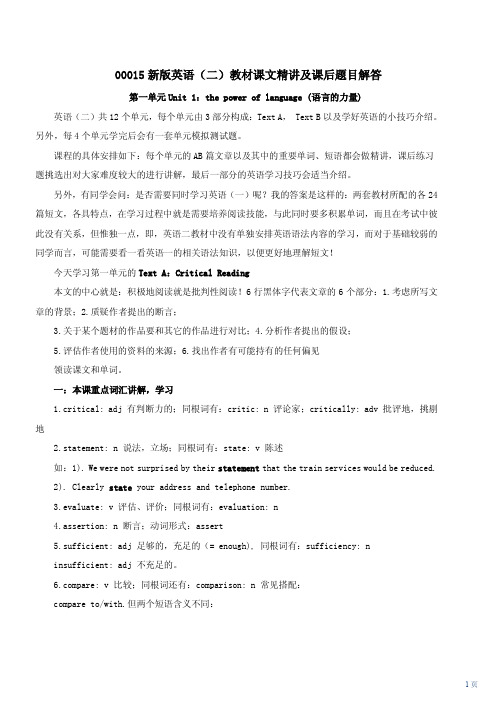
00015新版英语(二)教材课文精讲及课后题目解答第一单元Unit 1:the power of language (语言的力量)英语(二)共12个单元,每个单元由3部分构成:Text A, Text B以及学好英语的小技巧介绍。
另外,每4个单元学完后会有一套单元模拟测试题。
课程的具体安排如下:每个单元的AB篇文章以及其中的重要单词、短语都会做精讲,课后练习题挑选出对大家难度较大的进行讲解,最后一部分的英语学习技巧会适当介绍。
另外,有同学会问:是否需要同时学习英语(一)呢?我的答案是这样的:两套教材所配的各24篇短文,各具特点,在学习过程中就是需要培养阅读技能,与此同时要多积累单词,而且在考试中彼此没有关系,但惟独一点,即,英语二教材中没有单独安排英语语法内容的学习,而对于基础较弱的同学而言,可能需要看一看英语一的相关语法知识,以便更好地理解短文!今天学习第一单元的Text A:Critical Reading本文的中心就是:积极地阅读就是批判性阅读!6行黑体字代表文章的6个部分:1.考虑所写文章的背景;2.质疑作者提出的断言;3.关于某个题材的作品要和其它的作品进行对比;4.分析作者提出的假设;5.评估作者使用的资料的来源;6.找出作者有可能持有的任何偏见领读课文和单词。
一:本课重点词汇讲解,学习1.critical: adj 有判断力的;同根词有:critic: n 评论家;critically: adv 批评地,挑剔地2.statement: n 说法,立场;同根词有:state: v 陈述如:1). We were not surprised by their statement that the train services would be reduced.2). Clearly state your address and telephone number.3.evaluate: v 评估、评价;同根词有:evaluation: n4.assertion: n 断言;动词形式:assert5.sufficient: adj 足够的,充足的(= enough), 同根词有:sufficiency: ninsufficient: adj 不充足的。
自考英语二(00015)Unit6B知识点详解
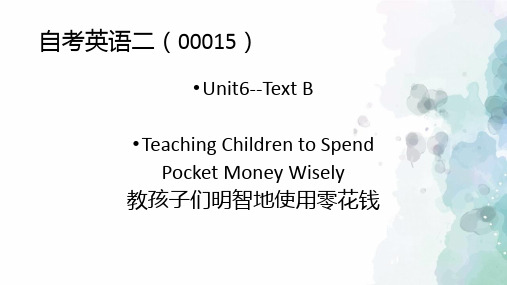
• 第一句讲解:(1) the way (in which / that) sb. does sth. 或者the way (in which / that) sth. is done 某人做某事的方式
• 正上学的孩子们需要零花钱来买吃的、买文具,还有支付公交费用。父母们采用不同的方 式来给予他们零花钱。有的父母会在月初或每周之初一次性给予孩子们一笔钱,有的更倾 向于每天给一些。然而,零花钱的给予方式却影响着孩子们花钱或省钱的方式。另一方面, 孩子们的消费习惯也会对父母给予零花钱的方式产生影响。
• Para 1.2 • The way in which pocket money is given affects how money is spent
• cause sb. to do sth. 让某人做某事 • depend / rely on sb. to do sth. 依赖某人做某事 • 注意depend的派生词:dependent (on/upon) • dependence (on/upon) • independent (of) • Independence Day
The child may spend every single cent of the daily pocket money by
overindulging in
,as they know they will get
another sum of money the next day. This
自考本科【00015】【英语二】

英语(二)讲义【00015】【内部资料】课程介绍一、课程性质英语(二)是高等教育自学考试各专业(英语专业除外)本科阶段的公共基础课。
目录第一部分语法知识 (4)第一单元名词形容词副词介词 (4)第一章名词 (4)第二章形容词 (5)第三章副词 (8)第四章介词 (10)第二单元谓语动词 (11)第一章系动词 (12)第二章情态动词 (12)第三章时态 (13)第四章英语语态 (16)第三单元非谓语动词 (17)第一章动词不定式 (18)第二章分词 (19)第四单元从句 (21)第一章名词性从句 (21)第二章形容词从句(定语从句) (21)第三章副词从句(状语从句) (21)第五单元并列结构 (22)第二部分应对技巧 (24)第一章阅读判断 (24)第二章阅读选择 (28)第三章概括段落大意和补全句子 (33)第四章填句补文 (36)第五章填词补文 (38)第六章完形补文 (40)第七章短文写作 (41)第一部分语法知识第一单元名词形容词副词介词第一章名词一、概念名词表示人、事物、地点或抽象概念的名称。
如:person,phone,China,time二、用法1.名词作主语和宾语。
●Knowledge is power.(知识就是力量。
)●I love English.(我喜欢英语。
)2.名词可以作定语修饰名词①作定语的名词往往是说明其中名词的材料、用途、时间、地点、内容、类别等②被修饰的名词变复数时,一般情况下,作定语用的名词不需要变为复数形式。
●a diamond ring(一枚钻戒)●orange juice(橙汁)●English lessons(英语课)3.名词分为可数名词和不可数名词,可数名词出现时,要么是复数名词,要么前面加限定词,如冠词(a、an或the),不可数名词永远是单数形式。
●He has a girlfriend.(他有一个女朋友。
)●He has two girlfriends.(他有两个女朋友。
《英语(二)》自学考试大纲
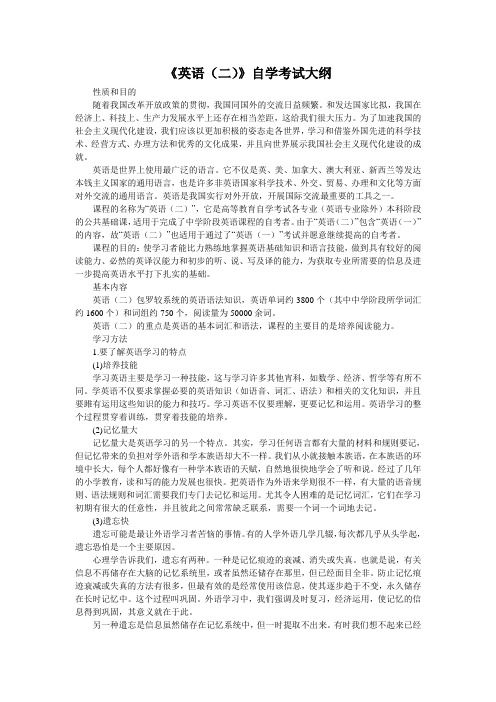
《英语(二)》自学考试大纲性质和目的随着我国改革开放政策的贯彻,我国同国外的交流日益频繁。
和发达国家比拟,我国在经济上、科技上、生产力发展水平上还存在相当差距,这给我们很大压力。
为了加速我国的社会主义现代化建设,我们应该以更加积极的姿态走各世界,学习和借鉴外国先进的科学技术、经营方式、办理方法和优秀的文化成果,并且向世界展示我国社会主义现代化建设的成就。
英语是世界上使用最广泛的语言。
它不仅是英、美、加拿大、澳大利亚、新西兰等发达本钱主义国家的通用语言,也是许多非英语国家科学技术、外交、贸易、办理和文化等方面对外交流的通用语言。
英语是我国实行对外开放,开展国际交流最重要的工具之一。
课程的名称为“英语(二)”,它是高等教育自学考试各专业(英语专业除外)本科阶段的公共基础课,适用于完成了中学阶段英语课程的自考者。
由于“英语(二)”包含“英语(一)”的内容,故“英语(二)”也适用于通过了“英语(一)”考试并愿意继续提高的自考者。
课程的目的:使学习者能比力熟练地掌握英语基础知识和语言技能,做到具有较好的阅读能力、必然的英译汉能力和初步的听、说、写及译的能力,为获取专业所需要的信息及进一步提高英语水平打下扎实的基础。
基本内容英语(二)包罗较系统的英语语法知识,英语单词约3800个(其中中学阶段所学词汇约1600个)和词组约750个,阅读量为50000余词。
英语(二)的重点是英语的基本词汇和语法,课程的主要目的是培养阅读能力。
学习方法1.要了解英语学习的特点(1)培养技能学习英语主要是学习一种技能,这与学习许多其他宵科,如数学、经济、哲学等有所不同。
学英语不仅要求掌握必要的英语知识(如语音、词汇、语法)和相关的文化知识,并且要雎有运用这些知识的能力和技巧。
学习英语不仅要理解,更要记忆和运用。
英语学习的整个过程贯穿着训练,贯穿着技能的培养。
(2)记忆量大记忆量大是英语学习的另一个特点。
其实,学习任何语言都有大量的材料和规则要记,但记忆带来的负担对学外语和学本族语却大不一样。
自考00015英语二考试重点复习资料
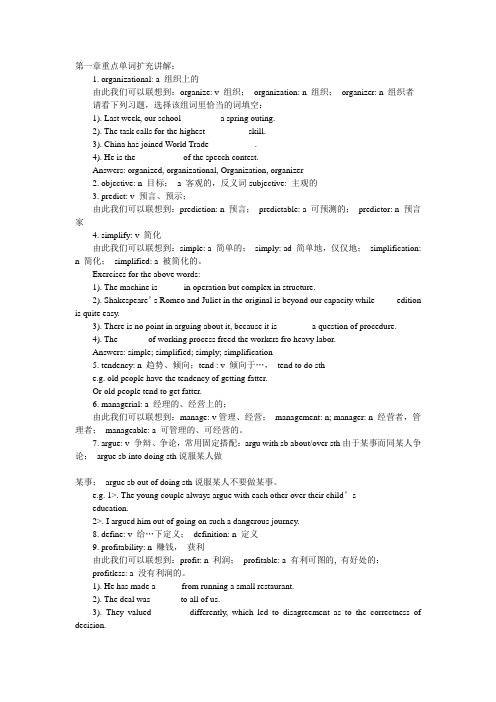
第一章重点单词扩充讲解:1. organizational: a 组织上的由此我们可以联想到:organize: v 组织;organization: n 组织;organizer: n 组织者请看下列习题,选择该组词里恰当的词填空:1). Last week, our school ________ a spring outing.2). The task calls for the highest _________ skill.3). China has joined World Trade __________.4). He is the __________ of the speech contest.Answers: organized, organizational, Organization, organizer2. objective: n 目标;a 客观的,反义词subjective: 主观的3. predict: v 预言、预示;由此我们可以联想到:prediction: n 预言;predictable: a 可预测的;predictor: n 预言家4. simplify: v 简化由此我们可以联想到:simple: a 简单的;simply: ad 简单地,仅仅地;simplification: n 简化;simplified: a 被简化的。
Exercises for the above words:1). The machine is _____ in operation but complex in structure.2). Shakespeare’s Romeo and Juliet in the original is beyond our capacity while ____ edition is quite easy.3). There is no point in arguing about it, because it is _______ a question of procedure.4). The ______ of working process freed the workers fro heavy labor.Answers: simple; simplified; simply; simplification5. tendency: n 趋势、倾向;tend : v 倾向于…,tend to do sthe.g. old people have the tendency of getting fatter.Or old people tend to get fatter.6. managerial: a 经理的、经营上的;由此我们可以联想到:manage: v管理、经营;management: n; manager: n 经营者,管理者;manageable: a 可管理的、可经营的。
《英语二》(课程代码:00015)课程考试大纲
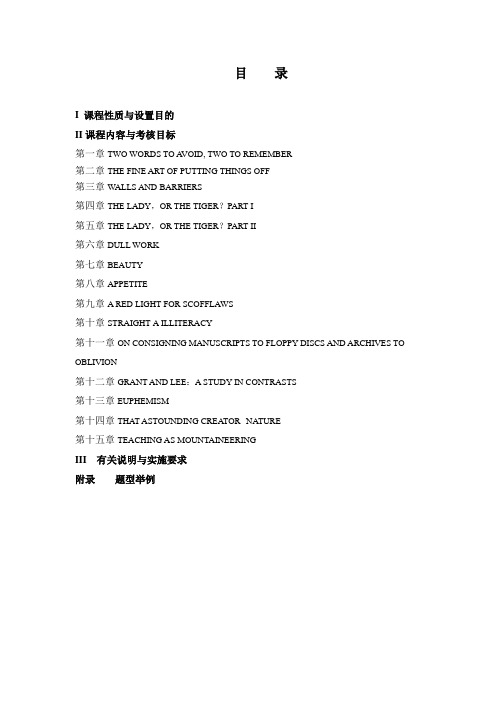
目录I 课程性质与设置目的II课程内容与考核目标第一章TWO WORDS TO A VOID, TWO TO REMEMBER第二章THE FINE ART OF PUTTING THINGS OFF第三章WALLS AND BARRIERS第四章THE LADY,OR THE TIGER?PART I第五章THE LADY,OR THE TIGER?PART II第六章DULL WORK第七章BEAUTY第八章APPETITE第九章A RED LIGHT FOR SCOFFLAWS第十章STRAIGHT-A ILLITERACY第十一章ON CONSIGNING MANUSCRIPTS TO FLOPPY DISCS AND ARCHIVES TO OBLIVION第十二章GRANT AND LEE:A STUDY IN CONTRASTS第十三章EUPHEMISM第十四章THAT ASTOUNDING CREATOR--NATURE第十五章TEACHING AS MOUNTAINEERINGIII 有关说明与实施要求附录题型举例I 课程性质与设置目的本课程是高等教育自学考试英语教育(独立本科段)考试计划中的核心课程之一。
设置本课程的目的可以归纳为如下几方面:1.引导学生注意吸收语言材料、扩大文化知识,特别是有关英美的文化知识。
2.通过对文章的思想内容、篇章结构、语言技巧的分析,提高学生对文章的理解、分析及评述的能力。
3.继续打好语言基本功,培养熟练技巧,努力发展学生综合应用英语的能力。
4.本课程重点章节为第2章,第3章,第4章,第5章,第6章,第7章,第8章,第9章,第11章,第12章,第13章,次重点为第10章,第15章,一般章节第1章,第14章。
II 课程内容与考核目标(考核知识、考核要求)第一章TWO WORDS TO A VOID, TWO TO REMEMBER一.学习目的与要求To grasp:1.the background of the story;2.the background of the author;anization and development of the text (narrative);4.detailed study of the text;5.Description in Narration二.课程内容:TWO WORDS TO A VOID, TWO TO REMEMBER三.考核知识点:1. Words and phrases of this unit;2. Organization and development of the text (narrative);3. Description in Narration四.考核要求识记:Words and phrases of this unit1. the sudden flash of insight that leaves you a changed person: the quick and spontaneous understanding that makes you a changed person2. fallen through: failed3. checkered tablecloth: tablecloth marked by light and dark patches4. chewing the bitter cud of hindsight: thinking repeatedly about the painful realization of what had happened5. he still carried a full case load: he still carried a briefcase fully loaded with documents6. They are not identified, of course: Their names are not given7. we might begin to get somewhere: succeed8. There's a perverse streak in all of us: obstinately unreasonable quality9. I shook my head ruefully: regretfully10. substitute a phrase that supplies lift instead of creating drag: use a phrase that provides a feeling of encouragement instead of causing nuisance11. with an audible click: clearly/without any doubt12. I spotted a cruising cab and ran toward it: taxi moving leisurely about, looking for passengers13. Then I wait for that almost perceptible mental click: the clear signal suggested by the Old man that can almost be felt in the mind领会:1. The Organization and development of the text (narrative);2. Description in Narration简单应用:Sentence structure and rewriting综合应用:Paragraph translation from Chinese to English第二章THE FINE ART OF PUTTING THINGS OFF一.学习目的与要求To grasp:1. Some allusions and historical events mentioned in the text(some see notes to the text)—Punic Wars and Quintus Fabius Maximus, Hamlet, Faustian encounters, Jean Kerr, etc.2. Organization and development of the text;3. Main idea of each paragraph.4. Style VS. Tone; Formal VS. Informal; (the use of formal style, formal words andphrases exaggeration to convey a gay and delightful tone);5. Level of Usage二.课程内容:THE FINE ART OF PUTTING THINGS OFF三.考核知识点:1.Words and phrases of this unit;2. Organization and development of the text;3. Main idea of each paragraph.4. Style VS. Tone; Formal VS. Informal四.考核要求识记:Words and phrases of this unit1. exhorted: urged strongly2. the elegant earl never got around to marrying his son's mother: found time for3. a habit of keeping worthies like Dr. Johnson cooling their heels for hours: men of importance like Dr. Johnson waiting4. That.…attests to the fact that: proves5. one of the great Roman generals was dubbed "Cunctator": named humorously6. for putting off battle until the last possible vinum break: until an effective defense deservinga celebration with champagne was ensured7. Moses pleaded a speech defect to rationalize his reluctance to deliver Jehovah's edict toPharaoh: claimed that he had a speech defect, and that he had reasons for8. at an ungodly 6:30 p.m.: unreasonable9. to file for an extension of the income tax deadline: apply officially10.until the apocalyptic voice of Diners threatens doom from Denver: warning, suggests unavoidable destruction11.They postpone, as Faustian encounters, visits to barbershop: as if they will see devils12.Yet for all the trouble procrastination may incur: in spite of13.the art of postponement had been virtually a monopoly of the military, diplomacy and the law: found almost only in the field of14.to ruminate about the situation with Singapore Sling in hand: go over in mind repeatedly and slowly15.Blessedly, he had no nattering Telex to order machine guns and fresh troops: fortunately, noisy16.Even there is no will, there is a way: there is no will to delay, there is a way to do so.17.in the higher echelons of business: in the case of higher levels18.The data explosion fortifies those seeking excuses for inaction: encourages, doing nothing19.His point is will taken: accepted20.Bureaucratization, which flourished amid the growing burdens of government and the greater complexity of society, was designed to smother policymaker in blanks of legalism, compromise and reappraisal: Excessive silly rules, which developed very quickly as a result of the expanding administrative structure and the greater complexity of society, were made to restrict policymakers, who have to be engaged in endless paperwork, mediation and reconsideration21.Many languages are studded with phrases that refer to putting things off: filled22.There are all sorts of rationalizations: reasons23.a kind of subliminal way of sorting the important from the trivial: way outside one's conscious awareness24.It is something of a truism: an undoubted truth25.for that matter: as further concerns the thing mentioned26.So…is the creation of an entree: a small carefully prepared meat dish27.the design can mellow and marinate: ripen and mature28.pace Lord Chesterfield: with all due respect to领会:1. Some allusions and historical events mentioned in the text(some see notes to the text)—Punic Wars and Quintus Fabius Maximus, Hamlet, Faustian encounters, Jean Kerr, etc.2. Organization and development of the text;3. Main idea of each paragraph.4. Style VS. Tone; Formal VS. Informal; (the use of formal style, formal words and phrasesexaggeration to convey a gay and delightful tone);简单应用:1. sentence structure and rewriting2. paragraph proofreading综合应用:Paragraph translation from Chinese to English第三章WALLS AND BARRIERS一.学习目的与要求To grasp:1.The Chief Personalities of Man2.Einstein’s Chief Personalities: Modesty, Simplicity, etc.3.Description Developed by Examples二.课程内容:WALLS AND BARRIERS三.考核知识点:1. Inductive analysis to help make his proposition logically sound.2. Comparison and contrasts3. Changes that have occurred in people’s notion of money, in the function of the bank, andaccordingly, in its architectural features — change in the form or design of architecture is the result of a change in people’s attitude.4. Organization and development of the text:Para.1& 2: beginning with quoting his fatherPara 3 & 4: a view of money in the past and now, architectural designs of banksPara 4: function of bankPara 6: classical and new criticism of architecturePara 7 & 9: attitude toward possible hositility from without in primitive and modernworldPara 8 &10: attitude toward privacy四.考核要求识记:Words and phrases of this unit1. to whom a good deal of modern architecture is unnerving: discouraging2. a tangible commodity: material3. that could be hefted: lifted for making out the weight4. to attract the custom of a sensible man: business patronage5. If a building's design made it appear impregnable: firm enough6. the institution was necessarily sound: in good condition7. the meaning of the heavy wall…dwelt in the prevailing attitude toward money, rather than in any aesthetic theory: was based on , on8. the most valuable elements are dash and a creative flair for the invention of large numbers: vigor and a creative ability9. the door to the vault, far from being secluded and guarded, is set out: not at all10.the older bank asserted its invulnerability: showed forcefully its freedom from harm11.it is hard to say where architecture ends and human assertion begins: expression of human attitudes12.walls are not simply walls but physical symbols of the barriers in men's minds: fears13.they could feel themselves to be in a delimited space: space with fixed limits14.the undeveloped technology of the period precluded the construction of more delicate walls: made impossible15.the fear of dissolution being the ultimate fear: death16.it has become questionable: not certain17.Men were dirty, prying, vile, and dangerous: nosy, evil18.the rooms faced not out, but in, toward a patio: inner roofless yard19.engaging in the intimate activities of a personal as against a public life: rather than20.The rich intricacies of the decorative arts of the period: complex details21….are as illustrative of this attitude as the walls themselves: illustrate as much22.by the conventions of law and social practice: agreements23.and the same goes for our homes: is true for24.Glass may accomplish this function: perform well25.people who still have qualms about eating…under conditions of high visibility: unpleasant feelings26.walls that will at least give them a sense of adequate screening: privacy due to separation27.the toilette taboo being still unbroken: forbidden practice28.To repeat, it is our changing conceptions of ourselves in relation to the world that determine: In a word, it is our attitudes toward29.The "open plan" and the unobstructed view are consistent with his faith in the eventual solution of all problems: view free from obstruction squarely express领会:1. Comparison and contrasts2. Changes that have occurred in people’s notion of money, in the function of the bank, andaccordingly, in its architectural features — change in the form or design of architecture is the result of a change in people’s attitude.3. Organization and development of the text.简单应用:1. sentence structure and rewriting2. paragraph proofreading综合应用:Paragraph translation from Chinese to English第四章THE LADY,OR THE TIGER?PART I一.学习目的与要求To grasp:1. General introduction of the story — about how justice is administered by a semi-barbaricking.2. Writing skills and style of the text;3. Literary genre: the short story二.课程内容:THE LADY,OR THE TIGER?PART I三.考核知识点:1.Words and phrases of this unit;2.The organization of the text3. Writing skills and style of the text;4. Literary genre: the short story四.考核要求:识记:Words and phrases of this unit1. somewhat polished and sharpened by the progressiveness of distant Latin neighbors: civilized2. whose ideas were still large, florid, and untrammeled, as became the half of him which was barbaric: sweeping, wild, and unrestrained, and so3. He was a man of exuberant fancy: wild and excessive4. he turned his varied fancies into facts: fancies of different kinds5. He was greatly given to self-communing: in the habit of discussing matters with himself6. his nature was bland and genial: gentle and cheerful7. some of his orbs got out of their orbits: subjects did something wrong8. to make the crooked straight, and crush down uneven places: to execute justice9. his barbarism had become semified: reduced to half of what it used to be10.the minds of his subjects were refined and cultured: improved and cultivated11.even the exuberant and barbaric fancy asserted itself: showed its power12.The vast amphitheater…was an agent of poetic justice: perfect13.he owed more allegiance to no tradition than pleased his fancy: stuck to no tradition except that which14.the fiercest and most cruel that could be procured: obtained with effort15.doleful iron bells were clanged: sad16.wended slowly their homeward way: moved over a distance17….should have merited so dire a fate: deserved so terrible18.the most suitable to his years and station: social rank19.to interfere with his great scheme of: to stop20. retribution and reward:, deserved punishment21.dancing maidens blowing joyous airs: tunes22.the wedding was promptly and cheerily solemnized: performed in a manner of formal religious ceremony23.the innocent man, preceded by children: headed24.strewing flowers on his path, led his bride to his home: scattering25.The decisions …were positively determinate: clear26.to witness a hilarious wedding: wedding causing wild laughter27.This element of uncertainty lent an interest to the occasion which it could not otherwise have attained: and this interest could not have been attained in other ways28.the thinking part of the community: those who did not follow the practice blindly in领会:1.Words and phrases of this unit;2.The organization of the text3. Writing skills and style of the text;4. Literary genre: the short story简单应用:1. sentence structure and rewriting2. paragraph proofreading综合应用:Paragraph translation from Chinese to English第五章THE LADY,OR THE TIGER?PART II一.学习目的与要求To grasp:1.Brief review of the background — Part I in Unit four, the semi-barbaric king and his way ofadministering justice.2.Structure of the text3.Psychological description of the princess;4.How does the author create the intensity of situation?5.The unconventional ending with a question and its effect.6.Literary genre: the short story二.课程内容:THE LADY,OR THE TIGER?PART II三.考核知识点:1.Words and phrases of this unit;2. Structure of the text3. Psychological description of the princess;4. How does the author create the intensity of situation?5. The unconventional ending with a question and its effect.6. Literary genre: the short story四.考核要求:识记:Words and phrases of this unit1. fervent and imperious as his own: strong and arrogant2. royal maiden was well satisfied with her lover: princess3. ardor that had enough of barbarism in it: eagerness4. waver in regard to his duty in the premises: falter to execute his power in his own territory5. deed with which the accused was charged had been done: romantic affair6. take an aesthetic pleasure in watching the course of events: enjoy watching with excitement7. admittance: right of entrance8. hum of admiration and anxiety: noise9. Possessed of more power: With10. possessed herself of the secret of the doors: managed to get11.the damsels of the court: unmarried young women of noble birth12. aspiring to one so far above him: desiring earnestly13. those whose souls are one: who understand each other very well14. lead us through devious mazes of passion: helps us get rid of the control of the confusing feelings and emotions of various kinds15.her soul was at a white heat beneath the combined fires of despair and jealousy: she suffered badly from the torture of despair and jealousy16.How often had she started in wild horror: been startled17.in the blessed regions: holy18. futurity: future time19.Her decision had been indicated in an instant: made clear20. anguished deliberation: agonizing self-debating21. presume to set myself up as the one person able to answer it: suppose to regard myself领会:1. Description of the princess, daughter of the semi-barbaric king;2. Her love with enough of barbarism for the young courtier of that fineness of blood and lowness of station3. Her combined fires of despair and jealousy;4. Her decision;5. Structure of the text6. The unconventional ending with a question and its effect.7. Literary genre: the short story简单应用:1. sentence structure and rewriting2. paragraph proofreading综合应用:Paragraph translation from Chinese to English第六章DULL WORK一.学习目的与要求To grasp:1.The organization of the text2. Classical Thetoric二.课程内容:DULL WORK三.考核知识点:1.Words and phrases of this unit;2.The organization of the text;3. Classical Thetoric四.考核要求:识记:Words and phrases of this unit1. assumption that: belief2. eventful lives: lives full of important events3. The opposite is nearer the truth: The fact that people who achieve much are often content with the routine uneventful lives they live4. an unalterable routine: a dull and regular5. transmute trivial impulses into momentous consequences: be inspired by seemingly unimportant sudden ideas for the success in great achievements6. what he can do with physiological pressures and hunger: his capacity to suffer illness and hunger7. vexation: discomfort8. seminal: highly original and influencing the development of future events9. equidistant from:equally distant10. insights: understandings11. inordinate humanness shows itself in the ability to make the trivial and common reach anenormous way: excessive human feature is embodied12. exhausts rather than stimulates: exhausts rather than stimulates creative power领会:1.The organization of the text2.Classical Thetoric简单应用:1. sentence structure and rewriting2. paragraph proofreading综合应用:Paragraph translation from Chinese to English第七章BEAUTY一.学习目的与要求To grasp:1.The organization of the text2.Definition二.课程内容:BEAUTY三.考核知识点:1. Words and phrases of this unit;2. The organization of the text;3. Definition四.考核要求:识记:Words and phrases of this unit1. what we have to call--lamely, enviously--whole persons: helplessly2. it was quite paradoxical: seemingly self-contradictory3.seductive: charming4. One of Socrates' main pedagogical acts was to be ugly: teaching5. we are more wary of the enchantments of beauty: careful about the different aspects of overall excellence6. We …split of--with the greatest facility--the "inside" from the "outside": very easily7. the central place of beauty in classical ideas of human excellence: ancient Greek and Roman8. Christianity set beauty adrift: out of control9. an alienated, arbitrary, …enchantment:, strange and capricious10. Associating beauty with women has put beauty even further on the defensive, morally: questionable in value11. Catholic countries…still retain some vestiges: traces12.of the pagan admiration for beauty:, ancient Greek and Roman13.to the detriment of the notion of beauty: which is harmful to领会:1. The organization of the text;2. Definition简单应用:1. sentence structure and rewriting2. paragraph proofreading综合应用:Paragraph translation from Chinese to English第八章APPETITE一.学习目的与要求To grasp:1.The organization of the text2.Sentence complexity and rhetorical effect3.Allusion: Oscar Wilde, Irish-born writer. Renowned as a wit in London literary circles, heachieved recognition with The Picture of Dorian Gray (1891), a novel. He also wrote plays of lively dialogue, such as The Importance of Being Earnest (1895), and poetry, including The Ballad of Reading Gaol (1898).4.Cultural tip: puritanical device and asceticism Puritan: A member of a group of EnglishProtestants who in the 16th and 17th centuries advocated strict religious discipline along with simplification of the ceremonies and creeds of the Church of England. It can also refer to someone who lives in accordance with Protestant precepts, especially one who regards pleasure or luxury as sinful.5. Definition Through Comparison and Example二.课程内容:APPETITE三.考核知识点:1. Words and phrases of the unit;2. The organization of the text3. Definition Through Comparison and Example四.考核要求:识记:Words and phrases of this unit1. Appetite is the keenness of living: strong desire to live on2. you are still curious to exist: eager3. you still have an edge on your longings: are still driven by strong desires4. taste its multitudinous flavours and juices: numerous5. I don't mean the lust for food: overwhelming desire6. any burning in the blood: any strong desire that you have7. who never got their heart's desire: were never satisfied8. I've always preferred wanting to having: being in the state of wanting something to having something9. the whole toffeeness of toffees: appeal for a child to eat toffees10.imperceptibly diminished: unaccountably11.a particular texture: structure of a substance12.deliberate fasting eating no food on purpose13.appetite is too precious to be bludgeoned into insensibility by satiation: destroyed by over-indulgence in what one likes14.I don't really want three square meals a day: good satisfying15.I want one huge, delicious, orgiastic, table-groaning blow-out: exciting, lavish meal heavyenough to cause the table to groan16.a way of anticipating a rare moment of indulgence: expecting领会:1.The organization of the text2.Sentence complexity and rhetorical effect3.Definition Through Comparison and Example简单应用:1. sentence structure and rewriting2. paragraph proofreading综合应用:Paragraph translation from Chinese to English第九章A RED LIGHT FOR SCOFFLAWS一.学习目的与要求:To grasp:1.The organization of the text2.This part concerns itself with legal English, so words often used in legal documents should bestudied thoroughly. ①Words denoting unlawfulness: illicit illegal lawless unofficial illegitimate criminal unauthorized unlicensed banned prohibited forbidden ②Words denoting people involved in lawsuit: culprit criminal sinner defendant accused offender plaintiff accuser prosecutor suitor ③words used in traffic laws: Double parking speeding speed limit red-light runner3.Evidence二.课程内容:A RED LIGHT FOR SCOFFLAWS三.考核知识点:1. Words and phrases of the unit;2. The organization of the text3. Evidence四.考核要求:识记:Words and phrases of this unit1. law and order: the condition of society in which given rules are respected and obeyed2. millions of Americans are taking increasing liberties with the legal codes: violating more frequently3. outlaw litter: unlawful strewing with rubbish4. illicit noise: noise too loud to be permitted5. motorized anarchy: disorder created by motorists6.a majority of Americans have blithely taken to committing: thoughtlessly been used to7.supposedly minor derelictions as a matter of course: negligence without feeling ashamed8.Scofflaws abounds: people who treat the law with contempt exist in large numbers9.the graffiti-prone: who are prone to cover walls with drawings or writings for fun10.Widespread flurries of ordinances: quantities of commands11.the beer-soaked hooliganism: the disorder of fighting or breaking things committed by excessive beer drinkers12.that plagues many parks: continually troubles13. pot smoker: marijuana addict14.to duck out of public sight to pass round a joint: escape from领会:1.The organization of the text2.Evidence简单应用:1. sentence structure and rewriting2. paragraph proofreading综合应用:Paragraph translation from Chinese to English第十章STRAIGHT-A ILLITERACY一.学习目的与要求:To grasp:1.Author’s definition of STRAIGHT-A ILLITERACY.2.The ability to Understand humor in Western context reflects the degree of culturalassimilation over the years of English learning. Ask students to point out the humors effect of these phrases: reaching its terminal stage providentially protectedthe basic opposing argument.3. Casual analysis二.课程内容:STRAIGHT-A ILLITERACY三.考核知识点:1.Words and phrases of the unit;2.The organization of the text3.Author’s definition of STRAIGHT-A ILLITERACY.4.Casual analysis四.考核要求:识记:Words and phrases of this unit1. a straight-A student: a student who gets A's for all courses taken2. to give him equal time with his widely publicized counterparts: as much attention as paid to those well-known ordinary illiterate people3. a highly articulate student: student who can use language very easily and fluently4. he has been awarded a coveted fellowship: a long-admired sum of money for admittance5. I shall call him, allegorically, Mr. Bright: figuratively6. It…gradually destroys the critical faculties: functions of the mind7. to detect gibberish in his own writing: meaningless talk8. The ordinary illiterate--perhaps providentially protected from college: luckily prevented by their poor ability of learning from entering college9. he is awarded the opportunity to move, inexorably, toward his fellowship: inescapably10.to admire it as profundity: profound matters11. he must grapple with such journals as: try to deal with12.journals bulging with barbarous jargon: full of outrageously meaningless talk or writing13.the pleasure principle: the human instinct of seeking pleasure and avoiding pain14. dichotomize: divide into two part15. bifurcate things: divide into two branches领会:1.The organization of the text2.Author’s definition of STRAIGHT-A ILLITERACY.3.Casual analysis简单应用:1. sentence structure and rewriting2. paragraph proofreading综合应用:Paragraph translation from Chinese to English第十一章ON CONSIGNING MANUSCRIPTS TO FLOPPY DISCS AND ARCHIVESTO OBLIVION一.学习目的与要求:To grasp:1.The organization of the text2.Discuss the impact of the development of science and technology on human history. Theyshould understand that the phrase history becomes now can be interpreted in another way.Associate this essay with Things: The Throw-away Society by Alvin Toffler.3.The rhetorical question二.课程内容:ON CONSIGNING MANUSCRIPTS TO FLOPPY DISCS AND ARCHIVES TO OBLIVION三.考核知识点:1. Words and phrases of the unit;2. The organization of the text;3. The rhetorical question四.考核要求:识记:Words and phrases of this unit1. on consigning manuscripts to floppy discs: putting manuscripts into the care of2. even the impoverished writers have turned to their Wangs: poor writers have begun to seek help from their Wangs3. We should deplore the disappearance of manuscripts: regret deeply4. Can this wobbly plastic reveal the hours: shaky5. beauty was born out of despair: the creation of beauty was the result of painstaking work, so much so that sometimes the writer lost hope6. blear-eyed wisdom was out of midnight oil: wisdom imbued in great works was the result of sleepless nights7. Manuscripts tells us what went on in a writer's soul, how he or she felt during the agony of creation: reveals to us the flow of the writer's thought, the strong passion poured into the hard work of creation8. Edna St. Vincent Millay may have burned the candle at both ends and wondered at its lovelylight: worked hard day and night for perfection and still not sure of it9. the copy with an occasional typo: printing error10.the bold handwriting has substituted a vivid verb for a flabby one: chosen a vivid verb to replace a weak one11.to switch a sentence or two around: to change the positions of a sentence or two12.The archives of a city are often musty collections of scribbled scraps of paper: collections of scribbled pieces of paper giving off odor suggestive of mould领会:1.The organization of the text2. The rhetorical question简单应用:1. sentence structure and rewriting2. paragraph proofreading综合应用:Paragraph translation from Chinese to English第十二章GRANT AND LEE:A STUDY IN CONTRASTS一.学习目的与要求:To grasp:1.The organization of the text2.The collision of different values and traditions, which led to America Civil War much morethoroughly.parison and Contrast二.课程内容:GRANT AND LEE:A STUDY IN CONTRASTS三.考核知识点:1.Words and phrases of the unit;2.The organization of the text3.The collision of different values and traditions, which led to America Civil War much morethoroughly.parison and Contrast四.考核要求:识记:Words and phrases of this unit1. These men were bringing the Civil War to its virtual finish: finish in essence though not formally2. To be sure,: It is true that3.the fugitive Confederate government would struggle desperately: the escaping4. But in effect the war was all over: practically5. the little room…was the scene of one of the poignant, dramatic contrasts in American history: deeply moving6. Back of Robert E. Lee was the notion that: At the back of7. the…concept might somehow survive: in some way8. the age of chivalry: the qualities of knights and institutions and values of the mediaeval Europe9. the rather hazy belief: uncertain。
00015英语二(2012版)讲义第01章
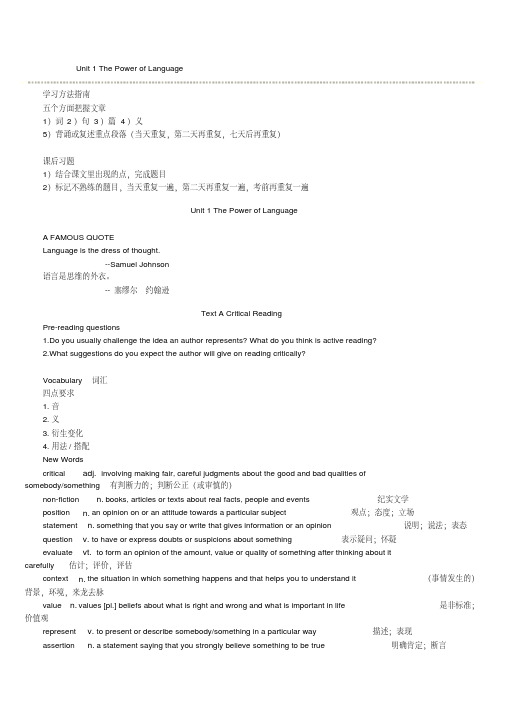
Unit 1 The Power of Language学习方法指南五个方面把握文章1)词 2)句 3)篇 4)义5)背诵或复述重点段落(当天重复,第二天再重复,七天后再重复)课后习题1)结合课文里出现的点,完成题目2)标记不熟练的题目,当天重复一遍,第二天再重复一遍,考前再重复一遍Unit 1 The Power of LanguageA FAMOUS QUOTELanguage is the dress of thought.--Samuel Johnson语言是思维的外衣。
--塞缪尔・约翰逊Text A Critical ReadingPre-reading questions1.Do you usually challenge the idea an author represents? What do you think is active reading?2.What suggestions do you expect the author will give on reading critically?Vocabulary 词汇四点要求1.音2.义3.衍生变化4.用法/搭配New Wordscritical adj.involving making fair, careful judgments about the good and bad qualities ofsomebody/something 有判断力的;判断公正(或审慎的)non-fiction n.books, articles or texts about real facts, people and events 纪实文学position n.an opinion on or an attitude towards a particular subject 观点;态度;立场statement n.something that you say or write that gives information or an opinion 说明;说法;表态question v.to have or express doubts or suspicions about something 表示疑问;怀疑evaluate vt.to form an opinion of the amount, value or quality of something after thinking about itcarefully 估计;评价,评估context n.the situation in which something happens and that helps you to understand it (事情发生的)背景,环境,来龙去脉value n.values [pl.] beliefs about what is right and wrong and what is important in life 是非标准;价值观represent v.to present or describe somebody/something in a particular way 描述;表现assertion n.a statement saying that you strongly believe something to be true 明确肯定;断言sufficient adj.enough for a particular purpose 足够的;充足的statistic n.statistics [pl.] a collection of information shown in numbers 统计数字;统计资料integrate v.to combine two or more things so that they work together (使)合并,成为一体authority n.a person with special knowledge 专家;学术权威;泰斗compare v.to examine people or things to see how they are similar and how they are different 比较;对比subject n.a thing or person that is being discussed, described or dealt with 主题;题目;题材consistent adj.in agreement with something 相符的;符合的inconsistency n.a situation in which two statements are different and cannot both be true 不一致assumption n.a belief or feeling that something is true or that something will happen, although thereis no proof 假定;假设case n.a particular situation or a situation of a particular type 具体情况;事例directly adv.in a direct line or manner 直接地;径直地identify v.to find or discover somebody/something 找到;发现valid adj.based on what is logical or true 符合逻辑的;合理的;确凿的credible adj.that can be believed or trusted 可信的;可靠的landmark n.an event, a discovery, an invention, ect.that marks an important stage in something (标志重要阶段的)里程碑relevant adj.closely connected with the subject you are discussing or the situation you are thinkingabout 紧密相关的;切题的current adj.happening now 现时发生的;当前的appropriate adj.suitable, acceptable or correct for the particular circumstances 合适的;恰当的bias n.a strong feeling in favour of or against one group of people, or one side in an argument, often.not based on fair judgement 偏见;偏心;偏向considerably adv.much; a lot 非常;很;相当多地Democrat n.a member or supporter of the Democratic Party of the US (美国)民主党党员,民主党支持者Republican n.a member or supporter of the Republican Party of the US (美国)共和党党员,共和党支持者reflect v.to show or be a sign of the nature of something or of somebody's attitude or feeling 显示;表明;表达informed adj.having or showing a lot of knowledge about a particular subject or situation 有学问的;有见识的重点词汇critical adj.involving making fair, careful judgments about the good and bad qualities ofsomebody/something 有判断力的;判断公正(或审慎的)eg: Try to develop a more critical attitude, instead of accepting everything at face value.要学会对一切事物一丝不苟, 而不要注重表面现象.其他用法:of or at a crisis; decisive; crucial 危机中的;危急时刻的;决定性的;关键的eg: We are at a critical time in our history.我们正处于历史的紧要关头。
自考00015英语(二)语法及历次考题讲解
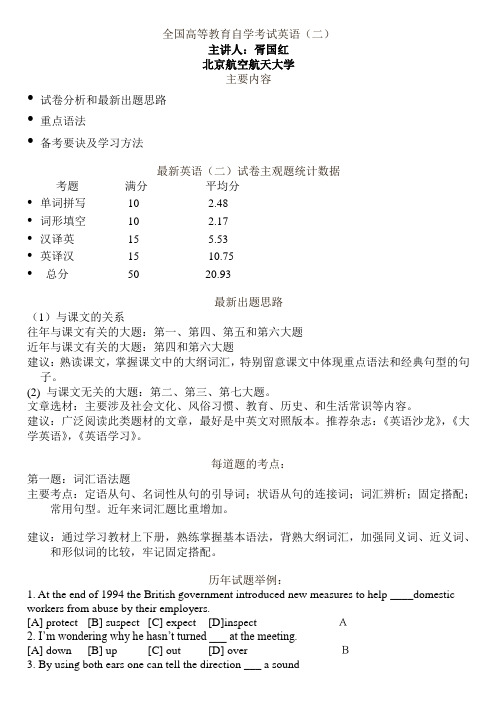
全国高等教育自学考试英语(二)主讲人:胥国红北京航空航天大学主要内容•试卷分析和最新出题思路•重点语法•备考要诀及学习方法最新英语(二)试卷主观题统计数据考题满分平均分•单词拼写10 2.48•词形填空10 2.17•汉译英15 5.53•英译汉15 10.75•总分50 20.93最新出题思路(1)与课文的关系往年与课文有关的大题:第一、第四、第五和第六大题近年与课文有关的大题:第四和第六大题建议:熟读课文,掌握课文中的大纲词汇,特别留意课文中体现重点语法和经典句型的句子。
(2) 与课文无关的大题:第二、第三、第七大题。
文章选材:主要涉及社会文化、风俗习惯、教育、历史、和生活常识等内容。
建议:广泛阅读此类题材的文章,最好是中英文对照版本。
推荐杂志:《英语沙龙》,《大学英语》,《英语学习》。
每道题的考点:第一题:词汇语法题主要考点:定语从句、名词性从句的引导词;状语从句的连接词;词汇辨析;固定搭配;常用句型。
近年来词汇题比重增加。
建议:通过学习教材上下册,熟练掌握基本语法,背熟大纲词汇,加强同义词、近义词、和形似词的比较,牢记固定搭配。
历年试题举例:1. At the end of 1994 the British government introduced new measures to help ____domestic workers from abuse by their employers.[A] protect [B] suspect [C] expect [D]inspect A2. I’m wondering why he hasn’t turned ___ at the meeting.[A] down [B] up [C] out [D] over B3. By using both ears one can tell the direction ___ a soundcomes.[A] in which [B] from which[C] over which[D] with which B第二题:完型填空题主要考点:除了第一大题已提到的考点外,还注重考察介词、连词、副词、代词等虚词的用法。
2023年4月高等教育自学考试00015英语(二)答案及解析
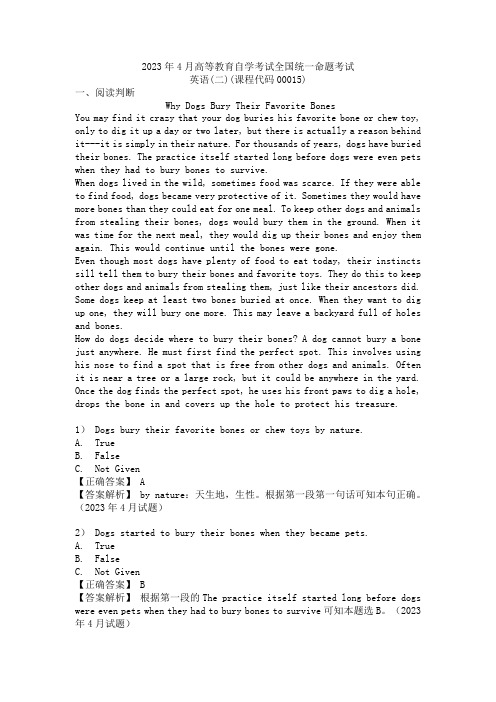
2023年4月高等教育自学考试全国统一命题考试英语(二)(课程代码00015)一、阅读判断Why Dogs Bury Their Favorite BonesYou may find it crazy that your dog buries his favorite bone or chew toy, only to dig it up a day or two later, but there is actually a reason behind it---it is simply in their nature. For thousands of years, dogs have buried their bones. The practice itself started long before dogs were even pets when they had to bury bones to survive.When dogs lived in the wild, sometimes food was scarce. If they were able to find food, dogs became very protective of it. Sometimes they would have more bones than they could eat for one meal. To keep other dogs and animals from stealing their bones, dogs would bury them in the ground. When it was time for the next meal, they would dig up their bones and enjoy them again. This would continue until the bones were gone.Even though most dogs have plenty of food to eat today, their instincts sill tell them to bury their bones and favorite toys. They do this to keep other dogs and animals from stealing them, just like their ancestors did. Some dogs keep at least two bones buried at once. When they want to dig up one, they will bury one more. This may leave a backyard full of holes and bones.How do dogs decide where to bury their bones? A dog cannot bury a bone just anywhere. He must first find the perfect spot. This involves using his nose to find a spot that is free from other dogs and animals. Often it is near a tree or a large rock, but it could be anywhere in the yard. Once the dog finds the perfect spot, he uses his front paws to dig a hole, drops the bone in and covers up the hole to protect his treasure.1) Dogs bury their favorite bones or chew toys by nature.A. TrueB. FalseC. Not Given【正确答案】 A【答案解析】 by nature:天生地,生性。
《00015英语二》重点知识汇总_202007
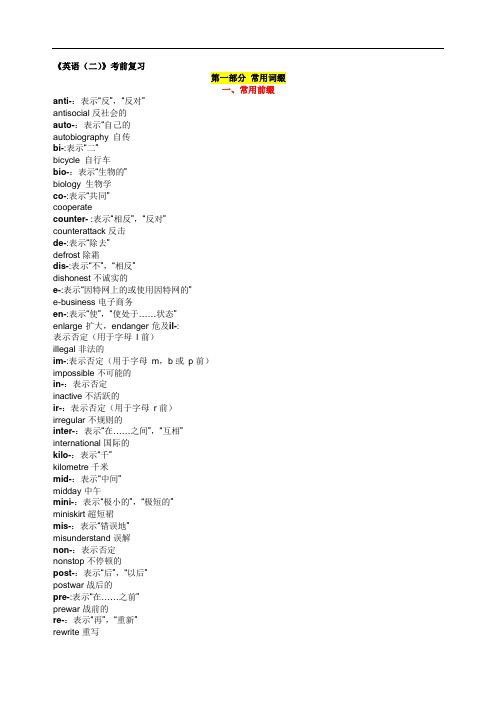
atomic原子的,economical节俭的
-ish
bluish带蓝色的,childish孩子气的
-ive
attractiless粗心的,homeless无家可归的
-ly
daily每天的,manly男子气概的
-ous
dangerous危险的,famous著名的
5.faithn.信任;相信;信心ingoodfaith真心实意地
6.soren.痛处;伤处;疮
a sore point with sb.令人恼怒的事;令人尴尬的事7.scene n.事件;场面;情景
make a scene发脾气;当众吵闹behind the scenes秘密地;在幕后on the scene在场;到场
sub-:表示“在……下面”subway地下铁路
super-:表示“超级” superhero超级英雄tele-:表示“远距离的”telescope望远镜
trans-:表示“横穿”,“横贯” transpacific横越太平洋的tri-:表示“三”
triangle三角形
un-:表示否定
unimportant不重要的
-some
troublesome讨厌的
-y
dirty脏的,thirsty渴的
(四)副词后缀
-ly
completely完全地,really真正地
-ward(s)
backward(s)向后,afterward(s)后来
-wise
clockwise顺时针地,likewise同样地
第二部分 重点词语及常用搭配
hit a brick wall/come up against a brick wall碰壁12.contribute v增加;增进;添加(到某物)contribute to有助于
英语(二)00015通关资料(最新版) (1)

1.应征型模板
某英文报社正在举办题为“ILikePlayingSports”的征文活动。请就此题目写一篇英文短文应征。内容包括以下两个方面:①你经常做什么体育运动;②体育运动对你有哪些好处。
(1)是什么我最喜欢的运动是篮球
There are many kinds of +题目, such as……My favorite +题目+ is……It is the first time I have……It is the best +题 目+ I have ever seen/ experienced. I did/ visited/learned……
(2)为什么:给出两个原因
万能理由:①与自身身体/学习知识相关 ②与友情/爱情等相关
First of all+原因1Second, I think+观点can also+原因2
00015英语二课文精讲讲义(4)

00015英语二课文精讲讲义(Unit4)Unit 4 The Joy of Work (工作的快乐)Text A Work is Blessing(工作是福)共7个自然段,领读课文和单词。
一:本课重点词汇讲解,学习1.blessing: n好事;动词:bless: v 祝福,保佑如:1). The rain will be a blessing for the farmers.2). May God bless you with a long life!plain: v 抱怨,埋怨;名词:complaint如:1). I’m going to complain to the manager about this.2). The most common complaint is about poor service.mitted: adj 尽心尽力的,坚定的;动词:commit犯罪,做错事;承诺,使…承担义务如:1). I have never committed any crime.2). I would like to commit myself to teaching all my life.3). She is a committed policewoman.4.remind: v提醒; reminder: n 提醒物如:Will you please remind me of his name?5.victim: n 受害者,牺牲品如:He said the female victim was his girlfriend。
6.terrorism: n 恐怖主义;terrorist: 恐怖分子7.depression: n 萧条,不景气,萎靡不振,沮丧。
如:1). She suffered from severe depression after losing her job.2). He never forgot the hardships he witnessed during the Great Depression (经济大萧条时期)of the 1930s.8.illegal: adj不合法的,反义词:legal合法的;legalize: v 使。
自考00015英语二重点语法复习笔记

自考00015英语二重点语法复习笔记1. 一般现在时(Simple Present Tense)1.1 定义与用法:一般现在时表示经常性、习惯性的动作或存在的状态。
常用时间状语有:always, usually, often, sometimes, every day/week/month/year, on weekends等。
1.2 谓语动词的构成:一般现在时的谓语动词构成:(1)一般动词:原形(2)第三人称单数(he/she/it):动词原形 + "s" / "es"(3)不可数名词或复数名词:动词原形1.3 示例:(1)I always go to bed early.(我总是早睡。
)(2)She watches TV every evening.(她每天晚上都看电视。
)(3)They eat breakfast at home.(他们在家吃早餐。
)2. 进行时态(Present Continuous Tense)2.1 定义与用法:进行时态表示现在正在进行的动作。
它一般用于表示现阶段的动作,常用时间状语有:now, at the moment, at present等。
2.2 谓语动词的构成:进行时态的谓语动词构成:be动词(am/is/are) + 现在分词(-ing形式)2.3 示例:(1)She is studying in the library now.(她现在正在图书馆学习。
)(2)We are watching a movie at the moment.(我们现在正在看电影。
)(3)He is eating dinner with his family.(他正在和家人一起吃晚饭。
)3. 一般过去时(Simple Past Tense)3.1 定义与用法:一般过去时表示过去某个时间发生的动作或存在的状态。
常用时间状语有:yesterday, last week/month/year, in 1999等。
00015英语二课文精讲讲义(11)
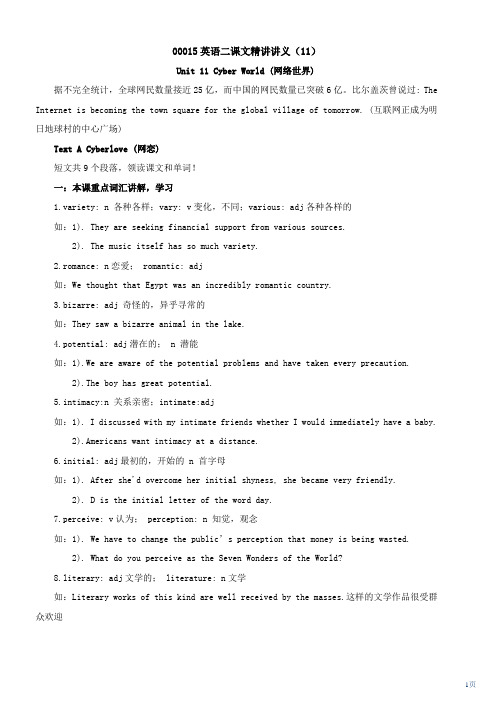
00015英语二课文精讲讲义(11)Unit 11 Cyber World (网络世界)据不完全统计,全球网民数量接近25亿,而中国的网民数量已突破6亿。
比尔盖茨曾说过: The Internet is becoming the town square for the global village of tomorrow. (互联网正成为明日地球村的中心广场)Text A Cyberlove (网恋)短文共9个段落,领读课文和单词!一:本课重点词汇讲解,学习1.variety: n 各种各样;vary: v变化,不同;various: adj各种各样的如:1). They are seeking financial support from various sources.2). The music itself has so much variety.2.romance: n恋爱; romantic: adj如:We thought that Egypt was an incredibly romantic country.arre: adj 奇怪的,异乎寻常的如:They saw a bizarre animal in the lake.4.potential: adj潜在的; n 潜能如:1).We are aware of the potential problems and have taken every precaution.2).The boy has great potential.5.intimacy:n 关系亲密;intimate:adj如:1). I discussed with my intimate friends whether I would immediately have a baby.2).Americans want intimacy at a distance.6.initial: adj最初的,开始的 n 首字母如:1). After she'd overcome her initial shyness, she became very friendly.2).D is the initial letter of the word day.7.perceive: v认为; perception: n 知觉,观念如:1). We have to change the public’s perception that money is being wasted.2). What do you perceive as the Seven Wonders of the World?8.literary: adj文学的; literature: n文学如:Literary works of this kind are well received by the masses.这样的文学作品很受群众欢迎10.inclination: n倾向,意愿;incline: v 趋向于,有。
自考00015《英语(二)》题型分析和考试重点

高等教育自学考试《英语(二)》题型分析及重点归类更多最新自考资料请在百度搜自考一点通一、《英语(二)》考试题型分析:根据历年考试情况来看,自考《英语(二)》这门课程题型基本不变,只是题量有所变化,我们以考试情况为例,题型大致包括以下六种题型,各题型及所占比值如下:由各题型分值分布比重我们可以看出,阅读题和翻译题占整体试卷的60%,因此,平时应多注意加强阅读,多动笔练习句子的翻译,尽可能的扩大词汇量。
而对于单词拼写和单词正确形式填空,则较容易拿分,需要大家清晰准确记忆单词以及它相关的一些其它词性。
而单选题和完形填空题,则需要大家对知识点全面把握,力求做到夯实基础,高效提分,最终顺利通过考试。
二、《英语(二)》考试重点说明:我们将知识点按考查几率及重要性分为三个等级,即一级重点、二级重点、三级重点,其中,一级重点为必考点,本次考试考查频率高;二级重点为次重点,考查频率较高;三级重点为预测考点,考查频率一般,但有可能考查的知识点。
Unit 11.alternative 单词含义P1.1.1 (二级重点) 单选,完形,单词拼写2.available 单词的含义P1.1.2 (二级重点) 单选,完形3.短语in the way P1.1.5 (三级重点)单选,完形4.单词predict P1.2.4(三级重点)单选,完形5.单词accompany的含义及用法P1.2.8(二级重点)单选6. tendency to do sth. P2.4.6(二级重点)完形,单词正确形式填空7. 短语contribute to的含义P2.6.2 (一级重点) 单选,翻译8. 单词simplify的含义以及它的几个变形simple - simplify - simplified. (一级重点) 单选,单词的正确形式填空。
9. 单词profit及它的变形profit – profitable (三级重点)单选,单词的正确形式填空。
自考00015英语二题库-短文写作
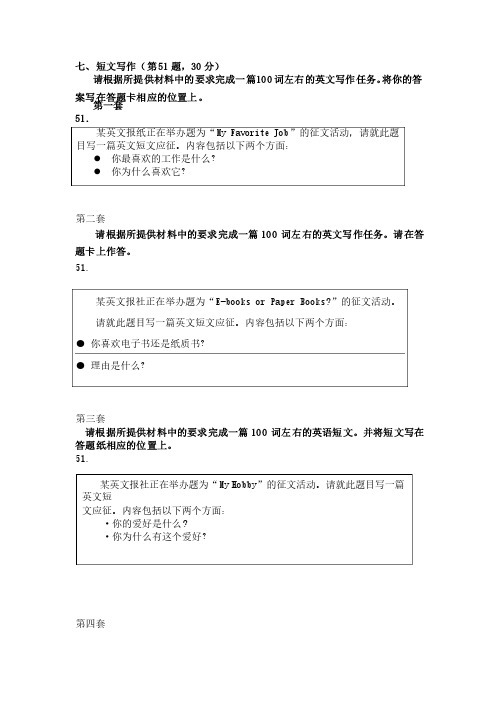
七、短文写作(第51题,30分)请根据所提供材料中的要求完成一篇100词左右的英文写作任务。
将你的答案写在答题卡相应的位置上。
第一套51.某英文报纸正在举办题为“某英文报纸正在举办题为“某英文报纸正在举办题为“My Favorite Job My Favorite Job My Favorite Job”的征文活动,请就此题”的征文活动,请就此题目写一篇英文短文应征。
内容包括以下两个方面:● 你最喜欢的工作是什么?你最喜欢的工作是什么?● 你为什么喜欢它?你为什么喜欢它?第二套第二套请根据所提供材料中的要求完成一篇100词左右的英文写作任务。
请在答题卡上作答。
51.某英文报社正在举办题为“某英文报社正在举办题为“E-books or Paper Books?E-books or Paper Books?E-books or Paper Books?”的征文活动。
”的征文活动。
”的征文活动。
请就此题目写一篇英文短文应征。
内容包括以下两个方面:● 你喜欢电子书还是纸质书?你喜欢电子书还是纸质书?● 理由是什么?理由是什么?第三套第三套请根据所提供材料中的要求完成一篇100词左右的英语短文。
并将短文写在答题纸相应的位置上。
51.第四套第四套 某英文报社正在举办题为“某英文报社正在举办题为“My My Hobby Hobby”的征文活动。
请就此题目写一篇”的征文活动。
请就此题目写一篇英文短英文短文应征。
内容包括以下两个方面:文应征。
内容包括以下两个方面:·你的爱好是什么·你的爱好是什么·你的爱好是什么? ?·你为什么有这个爱好?·你为什么有这个爱好?·你为什么有这个爱好?请根据所提供材料中的要求完成一篇100词左右的英语短文。
并将短文写在答题纸相应的位置上。
纸相应的位置上。
51.某英文报社正在举办题为“某英文报社正在举办题为“I Like Playing Sports I Like Playing Sports I Like Playing Sports”的征文活动。
自考本科段00015英语(二)英语二大纲(四颗星全)

序言本书根据自考英语(二)教学大纲编写,共收录4500词汇。
书中的每个英文单词都添加了标准的英式音标以及每个单词最常用的、一定需要掌握的,且最与大纲要求贴近的中文意思,供您在英语学习以及备考过程中使用,帮助您在复习备考过程中节省时间,有效提高复习效率。
需要特别提醒的是: 本书跟传统词汇书相同之处在于仍然按照字母表顺序,为的是便于您在复习和日常练习过程中快速查找单词;而不同之处在于,编者根据单词的难易程度,把4500个单词分成了四个等级:其中一颗星为最容易, 两颗星,三颗星,四颗星按顺序依次增加难度, 为的是便于您在学习中可以根据自己的水平,分级背诵复习,更好地提高记忆单词的效率.建议大家在开始记忆单词之前,把整个词汇书浏览一遍, 您会发现,在一颗星,两颗星中有很多单词是你非常熟悉因而不用再花时间记忆的,比如:a, about, apple, any等基础词汇。
您可以把这样的单词全部划掉,只留下您需要花时间记忆的单词,这样可以大大节约时间,提高效率。
同时还建议您使用这本大纲词汇进行词汇复习时,不仅关注其拼写方式及中文释义,更应着眼于每个词的词性,对于词性的熟知也是英语(二)考试中夺取高分的关键之一。
希望这本大纲词汇可以在您复习过程中祝您一臂之力,发挥其效果。
一级able [ˈeɪbl] adj. 能够的;有能力的about [əˈbaʊt] prep. 关于;大约above [əˈbʌv] prep. 超过;在…之上accept [əkˈsept] vt. 接受ache [eɪk] n. 疼痛across [əˈkrɔs] prep. 穿过;横穿act [ækt] vt.& vi. 行动;做add [æd] vt. 增加address [əˈdres] n.地址advice [ədˈvaɪs] n. 劝告,忠告advise [ədˈvaɪz] vt. 建议afraid [əˈfreɪd] adj. 害怕的;担心的again [əˈgen] adv. 又;再说against [əˈgenst] prep. (表示态度)反对age [eɪdʒ] n. 年龄ago [əˈɡəu] adv.以前;过去的;之前agree [əˈgri:] vt.& vi.同意,赞同ahead [əˈhed] adv.在前面aim [eɪm] vt.& vi.(以…)瞄准,针对air [eə(r)] n.天空airpor t [ˈɛəpɔ:t] n.机场airway [ˈeəˌweɪ] n.航线also [ˈɔ:lsəu] conj.另外although [ɔ:lˈðəu] conj.尽管;虽然altogether [ˌɔ:ltəˈgeðə(r)] adv.全部地always [ˈɔ:lweɪz] adv.总是,老是an [æn,ən] art.任一某一;一个a.m./A.M./AM [ˌeɪˈem] abbr.上午,午前ahead [əˈhed] adv.在前面aim [eɪm] vt.& vi.(以…)瞄准,针对air [eə(r)] n.天空airport [ˈɛəpɔ:t] n.机场airway [ˈeəˌweɪ] n.航线also [ˈɔ:lsəu] conj.另外although [ɔ:lˈðəu] conj.尽管;虽然altogether [ˌɔ:ltəˈgeðə(r)] adv.全部地always [ˈɔ:lweɪz] adv.总是,老是an [æn,ən] art.任一某一;一个a.m./A.M./AM [ˌeɪˈem] abbr.上午,午前alike [əˈlaɪk] adj.同样的,相似的alive [əˈlaɪv] adj.活着的;活泼的all [ɔ:l] adj.全部的;一切的allow [əˈlaʊ] vt.允许almost [ˈɔ:lməʊst] adv.几乎,差不多alone [əˈləun] adj.单独的;独一无二的along [əˈlɔŋ] prep.沿着;顺着alongside [əˌlɒŋˈsaɪd] prep.在…旁边aloud [əˈlaʊd] adv.高声;大声among/amongst [əˈmʌŋ]在…之内and [ənd] conj. 和,与anger [ˈæŋgə(r)] n. 生气animal [ˈænɪml] n. 动物another [əˈnʌðə(r)] adj. 又一个answer [ˈɑ:nsə(r)] vt.& vi. 答复;解答ant [ænt] n. 蚂蚁apple [ˈæpl] n. 苹果any [ˈeni] pron. 任何;无论哪个anybody [ˈenibɒdi] pron. 任何人anyone [ˈeniwʌn] pron. 任何人anything [ˈeniθɪŋ] pron. 任何东西April [ˈeɪprəl] n. 四月Asia[ˈeɪʃə] n. 亚洲ask[ɑ:sk] vt.& vi. 问,询问asleep[əˈsli:p] adj. 睡着的area [ˈɛəriə] n. 地区;区域arm [ɑ:m] n. 臂army [ˈɑ:mi] n. 军队around [əˈraʊnd] prep. 围绕;在附近arrival [əˈraɪvl] n. 到达,抵达arrive [əˈraɪv] vi. 到达art [ɑ:t] n. 艺术;艺术作品artist [ˈɑ:tɪst] n. 艺术家as[əz] conj. 像,像…一样;由于;同时author [ˈɔ:θə] n. 著作家;作者autumn [ˈɔ:təm] n. 秋;秋天await [əˈweɪt] vt. 等候; 等待August[ˈɔ:gəst] n. 八月(简写为Aug)Aunt [ɑ:nt] n. 阿姨;姨母away [əˈweɪ] adv. 远离; adj. 遥远的baby [ˈbeɪbi] n. 婴儿;幼稚的人back [bæk] n. 背部; adv. 以前;向后地bad [bæd] adj. 坏的,不好的bag [bæg] n. 袋ball [bɔ:l] n. 球banana [bəˈnɑ:nə] n. 香蕉band [bænd] n. 带;乐队bank [bæŋk] n. 银行bar [bɑ:(r)] n. 条,棒bark [bɑ:k] vi. 吠叫baseball [ˈbeɪsbɔ:l] n. 棒球basket [ˈbɑ:skɪt] n. 篮basketball [ˈbɑ:skɪtbɔ:l] n. 篮球bat [bæt] n. 蝙蝠;短棍bath [bɑ:θ] n. 沐浴;洗澡battle [ˈbætl] vt.& vi. 与…作战;n. 战争bean [bi:n] n. 豆bear [bɛə] n. 熊;vt. 忍受;承担beard [biəd] n. 胡须because [bɪˈkɒz] conj. 因为become [bɪˈkʌm] vi. 变为,成为bed [bed] n. 床;苗圃;河床bedroom [ˈbedru:m] n. 卧室,寝室bee [bi:] n. 蜜蜂beef [bi:f] n. 牛肉beer [biə] n. 啤酒before [bɪˈfɔ:(r)] conj. & prep.在…之前behind [bɪˈhaɪnd] prep & adv.在…的后面believe [bɪˈli:v] vt. 相信;以为,认为bell [bel] n. 钟,铃belt [belt] n. 腰带beside [bɪˈsaɪd] prep.除..之外;在…旁边besides [bɪˈsaɪdz] adv.此外2best [best] adj.最好的( good,well最高级) better [ˈbetə(r)] adj. 更好big [bɪg] adj. 大的;重要的bike/bicycle [baɪk]/ [ˈbaɪsɪkl] n. 自行车bill [bɪl] n. 账单bird [bə:d] n. 鸟biscuit [ˈbɪskɪt] n. 饼干black [blæk] adj. 黑的blackboard [ˈblækbɔ:d] n. 黑板block [blɔk] n. 块;街区; vt. 阻止;阻塞blog [blɒɡ] n. 博客blood [blʌd] n. 血,血液bloody [ˈblʌdi] adj. 血腥的,残忍的bloom [blu:m] vi. 开花blossom [ˈblɒsəm] n. 花;开花时期blouse [blauz] n. 宽松的上衣;女衬衫blow [bləu]vt.&vi. 吹;(轮胎)爆炸blue [blu:] n. 蓝色; adj. 蓝色的;沮丧的boat [bəut] n. 小船body [ˈbɔdi] n. 身体book [bʊk] n. 书bor row [ˈbɒrəʊ] vt.& vi. 借入boss [bɔs] n. 老板,上司both [bəuθ] adj. 两者都; pron. 二者bottle [ˈbɔtl] n. 瓶子box [bɔks] n. 盒; vt.& vi. 拳击boxing [ˈbɒksɪŋ] n. 拳击;boy [bɔɪ] n. 男孩,少年brain[breɪn] n. 脑breakfast [ˈbrekfəst] n. 早餐,早饭bridge [brɪdʒ] n. 桥brother [ˈbrʌðə(r)] n. 兄弟bull [bʊl] n. 公牛bus [bʌs] n. 公共汽车,巴士but [bət] conj. 但是; prep. 除…以外buy [baɪ] vt.& vi. 购买,购得cake [keɪk] n. 蛋糕;糕饼cap [kæp] n. 盖;帽子car [kɑ:(r)] n. 车,汽车card [kɑ:d] n. 卡片;纸牌carry [ˈkæri] vt.& vi. 运送;搬运case [keɪs] n. (实)例,事例cat [kæt] n. 猫catch [kætʃ] vt. 赶上;接住center/-tre [ˈsentə] n. 中心chair [tʃɛə] n. 椅子chalk [tʃɔ:k] n. 粉笔cheek [tʃi:k] n. 脸颊,脸蛋child [tʃaɪld] n. 小孩,孩子childhood [ˈtʃaɪldhʊd] n. 童年china [ˈtʃaɪnə] n. 瓷器China [ˈtʃaɪnə] n. 中国Chinese [ˌtʃaɪˈni:z] n.& adj. 中国人(的) chocolate [ˈtʃɒklət] n. 巧克力choice [tʃɔɪs] n. 选择;选择权Christmas [ˈkrisməs] n. 圣诞节church [tʃə:tʃ] n. [宗]教堂cigar [sɪˈgɑ:(r)] n. 雪茄; 叶卷烟city [ˈsɪti] n. 城市class [klɑ:s] n. 班;等级classmate [ˈklɑ:smeɪt] n. (同班)同学classroom [ˈklɑ:sru:m] n. 教室,课堂clean [kli:n] adj. 清洁的v.(使)清洁clear [kliə] adj. 清楚的,明白的clever [ˈklevə(r)] adj. 聪明的,灵巧的climate [ˈklaɪmət] n. 气候climb [klaɪm] vt.& vi. 爬上,攀登clock [klɔk] n. 钟,时钟close [kləuz] adj. 紧密的;亲密的; vt. 关cloth [klɔθ] n. 布,织物clothes [kləuðz] n. 衣服,衣物cloud [klaʊd] n. 云cloudy [ˈklaʊdi] adj. 多云的;阴天的club [klʌb] n. 俱乐部coal [kəul] n. 煤coat [kəut] n. 上衣,外套Coca-Cola [ˈkəʊkəˈkəʊlə] n. 可口可乐cock [kɔk] n. 公鸡code [kəud] n. [计算机]编码;代号coffee [ˈkɒfi] n. 咖啡coin [kɔɪn] n. 硬币cold [kəuld] adj. 寒冷的;冷淡的college[ˈkɒlɪdʒ] n. 大学colo(u)r [ˈkʌlə] n. <美>颜色,色彩come [kʌm] vi. 来computer [kəmˈpju:tə(r)] n. 电脑comrade [ˈkɔmrid] n. 同志;战友concert [ˈkɔnsət] n. 音乐会consider [kənˈsɪdə(r)] vt.& vi. 认为cool [ku:l] adj. 凉爽的;vt.& vi. 变凉copy [ˈkɔpi] n. 复制品;vt.& vi. 复制cord [kɔ:d] n. (细)绳corner [ˈkɔ:nə(r)] n. 角落cottage [ˈkɒtɪdʒ] n. 小屋,村舍cotton [ˈkɔtən] n. 棉;棉线cough [kɔf] vt.& vi. 咳嗽could [kəd] aux. “can”的过去式;能够country [ˈkʌntri] n. 国家countryside [ˈkʌntrisaɪd] n. 乡村;郊野county [ˈkaʊnti] n. 县,郡couple [ˈkʌpl] n. 对,双;配偶course [kɔː(r)s] n. 科目;进程court [kɔ:t] n. 法院,法庭cover [ˈkʌvə(r)] vt. 覆盖,遮蔽cow [kaʊ] n. 奶牛,乳牛cowboy [ˈkaʊbɔɪ] n. 牛仔crop [krɔp] n. 农作物cross [krɔs] n. 十字架; vt. 杂交;横跨crossing [ˈkrɒsɪŋ] n. 十字路口cry [kraɪ] vt.& vi. 哭;喊cube [kju:b] n. 立方形,立方体cup [kʌp] n. 杯子cupboard [ˈkʌbəd] n. 柜橱;食物柜curtain [ˈkə:tn] n. 窗帘,门帘cut [kʌt] vt.& vi. 将(某物)切开daily [ˈdeɪli] adj. 每日的,日常的dance [dɑ:ns] vi. 跳舞; n. 跳舞danger [ˈdeɪndʒə(r)] n. 危险;危险物dark [dɑ:k] adj. 黑暗的,深色的darkness [ˈdɑ:knəs] n. 黑暗data [ˈdeɪtə] n. 资料date [deɪt] n. 日期; vt.& vi. 与人约会daughter [ˈdɔ:tə(r)] n. 女儿dead [ded] adj. 死去的dean [di:n] n. 学院院长,系主任dear [diə] adj. 亲爱的death [deθ] n. 死亡December [dɪˈsembə(r)] n. 12月deed [di:d] n. 行为deep [di:p] adj. 深的;深远的deer [diə] n. 鹿desert [ˈdezət] n. 沙漠; adj. 沙漠的desk [desk] n. 书桌,办公桌dial [ˈdaɪəl] vt.& vi. 打电话diamond [ˈdaɪəmənd] n. 钻石,金刚石diary [ˈdaɪəri] n. 日记,日志dictionary [ˈdɪkʃənri] n. 词典,字典die [daɪ] vt.& vi. 死亡,熄灭disease [dɪˈzi:z] n. 疾病dish [dɪʃ] n. 盘;餐具disk/disc [dɪsk] n. 磁盘;唱片dislike [dɪsˈlaɪk] vt. 不喜欢;厌恶do[də] vt.& vi. 做;干doctor [ˈdɔktə]n. 医生,大夫;博士dog[dɔɡ] n. 狗doll[dɔl] n. 木偶;玩偶dollar [ˈdɔlə]n. 美元donkey [ˈdɔŋki]n. 驴;笨蛋,傻瓜door [dɔ:]n.门dose [dəus]n. 剂量,药量dot [dɔt] n. 点,小圆点double [ˈdʌbl]adj. 双的;两倍的down [daun]adv. 向下;prep.向下downstairs [ˌdaʊnˈsteəz]adv. 在楼下d owntown[ˌdaʊnˈtaʊn]n. 市中心drag [dræɡ]vt. 拖拽;吃力地往前拉dragon[ˈdræɡən]n. 龙duck[dʌk]n. 鸭子,野鸭;鸭肉drug[drʌg] n. 药物;药剂; 毒品drawer [drɔ:]n. 抽屉drawing [ˈdrɔ:ɪŋ]n.绘画; 图画dream [dri:m] vt.&vi. 做梦n. 梦想dry[draɪ] adj. 干燥的,干旱的dress [dres]n. 衣服vt.& vi. 给…穿衣dumpling[ˈdʌmplɪŋ] n. 汤团;饺子during[ˈdjuəriŋ]prep.在…期间drink[driŋk]vt.& vi. 喝;n. 酒,饮料drip[drip] vi. 滴出;n.水滴;[医]点滴drive[draiv]v. 驾驶;开车;驱动;迫使driver [ˈdraivə]n. 驾驶员,司机duty[ˈdju:ti]n. 职责,责任;义务drop [drɔp]vt.& vi. 落下;n. 滴dyeeach[i:tʃ] adj. 各自的pron. 每个;各自ear [iə]n. 耳朵early[ˈɜrli ]adj. 早的;早期的earth[ə:θ]n. 地球;地表,陆地east [iːst]n. 东,东方eastern[ˈi:stən]adj. 东方的easy[ˈi:zi] adj. 容易的;舒适的;从容的eat [i:t]vt.& vi. 吃egg[eɡ]n. 鸡蛋,蛋eggplant[ˈegplɑ:nt] n. 茄子Egypt[ˈi:dʒɪpt] n. 埃及eight[eɪt]num.八;八个eighteen[eɪˈti:n]num. 十八;十八个eighth [eɪtθ]num. 第八eighty[ˈeɪti:]num.八十either[ˈaiðə]pron.(两者之中)任何一个elephant[ˈelifənt]n. 象,大象eleven [ɪˈlevən]num. 十一;十一个else [els]adv. 其他;否则;另外email/e-mail [ˈi:meɪl] n. 电子邮件enemy[ˈenimi]n. 仇敌;敌军England[ˈɪŋglənd]n. 英格兰;英国English [ˈɪŋglɪʃ]n. 英语adj.英语的enter[ˈentə]vt.& vi. 进入;开始era[ˈɪərə]n. 纪元,年代even [ˈi:vn] adv. 甚至;更加;即使evening[ˈi:vniŋ]n. 傍晚;黄昏ever[ˈevə]adv. 永远;曾经every[ˈevri]adj.每一个everybody [ˈevribɔdi]pron. 每人,人人everyday[ˈevridei]adj. 日常的,平常的everyo ne[ˈevriwʌn]pron. 每人,人人everything[ˈevriθiŋ]pron. 每件事物exam(ination)[iɡˈzæm]n. 考试;测验examine[iɡˈzæmin]vt. 检查,调查example[iɡˈzɑ:mpl]n. 例子;榜样eye[ai]n. 眼睛face [feis]n.脸;vt.& vi. 面对factory[ˈfæktri] n. 工厂,制造厂family[ˈfæmili] n.家fan[fæn] n. 扇子farm [fɑ:m] n.农场farmer [ˈfɑ:mə] n.农场主,农民;承包人fat[fæt] adj.肥的;油腻的n.脂肪father[ˈfɑ:ðə(r)] n. 父亲February [ˈfebruəri] n.二月feel [fi:l] vt.& vi.感觉;认为n. feeling [ˈfi:lɪŋ] n. 感觉,情绪;感情fifth[fɪfθ] num. 第五fifty [ˈfɪfti] num. 五十film [film] n.影片;电影finger [ˈfɪŋgə(r)] n. 手指finish [ˈfɪnɪʃ] vt.& vi. 结束n. 结束first[fə:st] num. 第一fish [fɪʃ] n. 鱼vt.& vi. 捕鱼fisherman [ˈfiʃəˌmən] n.渔夫,渔民five [faɪv] num. 五flower [ˈflaʊə(r)] n. 花food [fu:d] n.食物,食品foot [fʊt] n. 脚football [ˈfʊtbɔ:l] n. 足球for [fə(r)] prep.为了conj. 因为,由于foreign [ˈfɔrin] adj. 外国的,外交的foreigner [ˈfɒrənə(r)] n. 外国人forest [ˈfɒrɪst] n. 森林forty [ˈfɔ:ti:] n. 四十four [fɔ:(r)] num. 四fourteen [ˌfɔ:ˈti:n] num. 十四fourth [fɔ:θ, fəʊrθ] num. 第四franc [fræŋk] n.法郎France [fræns] n.[地名]法国free [fri:] adj. 自由的;免费的fruit [fru:t] n. 成果;水果full [fʊl] adj. 满的,完全的Friday [ˈfraɪdeɪ] n. 星期五friend [frend] n.朋友frog [frɔɡ] n. 青蛙front [frʌnt] n. 前面adj. 前面的game [geɪm] n. 游戏;比赛garden ['ɡɑ:dn] n. 花园;菜园gas [ɡæs] n. 气体;汽油gate [ɡeit] n. 大门get [ɡet] vt. 使得;获得gift [ɡift] n. 礼物vt. 赋予girl [ɡə:l] n. 女孩,姑娘give [ɡiv] vt. 给;产生glass [ɡlɑ:s, ɡlæs] n. 玻璃glasshouse n. 温室;暖房go [ɡəu] vi. 走;达到goal [ɡəul] n. 目标;球门goat [ɡəut] n. 山羊god n. 神gold [ɡəuld] n. 金,黄金grandfather ['ɡrænd,fɑ:ðə] n. 祖父;始祖grandmother ['ɡrænd,mʌðə] n. 祖母grass [ɡrɑ:s, ɡræs] n. 草;草地,草坪great [ɡreit]adj. 伟大的Greece [ɡri:s] n. 希腊(欧州南部国家)green [ɡri:n] adj. 绿色的;n. 绿色ground [ɡraund] n. 地面group [ɡru:p] n. 组;团体; vt.把…分组grow [ɡrəu] vt &vi. 发展;生长guess [ɡes] vt &vi. 猜; n. 猜测;推测guest [ɡest] n. 客人gun [ɡʌn] n. 枪枝hair [hɛə]n. 头发,毛发half[hɑ:f] adj. 一半的,半个的hand [hænd] n. 手handbag [ˈhændbæg] n.(女用)手提包happiness[ˈhæpɪnɪs] n. 幸福;高兴;happy [ˈhæpi] adj. 幸福的hard[hɑrd] adj. 困难的;硬的hat[hæt] n. 帽子head[hed] n.头脑hear[hiə] vt.& vi. 听到,听见hearing [ˈhɪərɪŋ] n. 听力,听觉heart[hɑ:t] n. 心脏;heat[hi:t] n. 热度heaven [ˈhevn] n. 天;天堂heavy[ˈhevi] adj. 重的,沉重的helpless [ˈhelpləs] adj. 无助的;无能的hen[hen] n. 母鸡1hence [hens] adv. 因此,所以4her[hə(r)] pron. (she的宾格)她;(she的所有格)她的here[hiə] adv. 在这里hers [hə:z] pron. (she的物主代词)她的hill [hɪl]n. 小山,山冈;斜坡him [hɪm] pron. (he的宾格)他his [hɪz] pron. (he的所有格)他的history [ˈhɪstri] n. 历史,历史学hole [həul] n. 洞穴,穴holiday [ˈhɒlədeɪ] n. 假日,休息日home [həum] n. 家;家庭hometown [ˈhəʊmtaʊn] n. 家乡,故乡homework[ˈhəumwə:k]n. 家庭作业horse [hɔ:s] n. 马hospital[ˈhɒspɪtl] n. 医院hot [hɔt] adj. 热的;辣的;热门的hot dog n.热狗hotel [həʊˈtel] n. 旅馆,宾馆,酒店hour[ˈaʊə(r)] n. 小时,钟头house [haʊs] n. 住宅;家庭how[haʊ] adv. 怎样;健康状况如何husband[ˈhʌzbənd]n. 丈夫ice[aɪs] n. 冰;雪糕if [ɪf] conj. 如果,倘若ink [iŋk] n.墨水,油墨inn [in] n.小旅馆,客栈insect [ˈinsekt] n.虫,昆虫jacket [ˈdʒækɪt] n. 短上衣,夹克jeep [dʒi:p] n. 吉普车job [dʒɔb] n.工作join [dʒɔɪn] vt.& vi. 连接;联结July [dʒuˈlaɪ] n. 七月jump [dʒʌmp] vt. 跳;跳过June [dʒu:n] n. 六月junior [ˈdʒu:niə(r)]just [dʒʌst] adv. 刚才;仅仅keep [ki:p] vt. 保持;保留;遵守key [ki:] n. 钥匙;(电脑的)键; 秘诀kill [kɪl] vt.& vi. 杀死kilo [ˈkiləu] n. 千克kilogram(me) [ˈkɪləgræm] n. 千克kilometer/-tre [ˈkiləˌmi:tə] n. <美>千米king [kɪŋ] n. 国王kingdom [ˈkɪŋdəm] n. 王国kiss [kɪs] vt. 接吻; n. 吻kitchen [ˈkɪtʃɪn] n. 厨房;厨师kite [kaɪt] n. 风筝knife [naɪf] n. 刀;匕首know [nəʊ] vt.& vi. 知道lady [ˈleɪdi] n. 女士lake [leɪk] n. 湖lamb [læm] n. 羔羊,小羊lamp [læmp] n. 灯,灯泡land [lænd] n. 陆地; vt.& vi. (使)登岸large [lɑ:dʒ] adj. 大的last [lɑ:st] adj. 最后的; n. 末尾;最后late [leɪt] adj. 晚的,迟到的laugh [lɑ:f] vi. 笑;发笑laughter [ˈlɑ:ftə] n. 笑,笑声law [lɔ:] n. 法;法学lawyer [ˈlɔ:jə(r)] n. 律师lead [lid] vt. 领导;引导leader [ˈli:də(r)] n. 领袖,领导者leave [li:v] vt.& vi. 离去;出发leg [leg] n. 腿;支柱lend [lend] vt. 把…借给let [let] 允许,任由;让letter [ˈletə(r)] n. 信letter-box [ˈletəbɒks] n. 邮筒,邮政信箱life [laɪf] n. 生活,生计;生命lifetime [ˈlaɪftaɪm] n. 一生,寿命light [laɪt] n. 光; vt. & vi 使发光;点燃like [laɪk] vt. 喜欢; prep.像conj. 像listen [ˈlɪsn] vi. 倾听little [ˈlɪtl] adj. 小的;琐碎的live [liv] vi. 生存;居住adj. 活着的London [ˈlʌndən] n. 伦敦(英国首都)look [lʊk] vt.& vi. 看,瞧11make [meɪk] vt. 做,制造man [mæn] n. 男人;人类many [ˈmeni] adj. 许多的map [mæp] n.地图March [mɑ:tʃ] n. 三月may [meɪ] aux. 可以;也许;会;但愿May [May] n.五月me [mi] pron. (人称代词I的宾格)我meal [mi:l] n. 餐,饭meet [mi:t] vt.& vi. 相遇;相识meeting [ˈmi:tɪŋ] n. 会议;聚会meter [ˈmi:tə(r)] n. (计量单位) 米mid-autumn [mɪd ˈɔ:təm] 中秋midday [ˌmɪdˈdeɪ] n. 中午;正午middle [ˈmɪdl] adj. 中部的n. 中部midnight [ˈmɪdnaɪt] n. 子夜,午夜might [maɪt] aux. 表示可能milk [mɪlk] n. 乳;牛奶mine [maɪn] pron. (I的所有格)我的minute [ˈminit] n. 分,分钟Miss [mɪs] n.小姐;女士Monday [ˈmʌndi] n. 星期一,周一money [ˈmʌni] n. 钱,货币monkey [ˈmʌŋki] n. 猴month [mʌnθ] n. 月,月份monthly [ˈmʌnθli] adj. 每月的moon [mu:n] n. 月亮moon-cake ['mu:nkeik] n. 月饼morning [ˈmɔ:niŋ] n. 早晨mother [ˈmʌðə(r)] n. 母亲motherland [ˈmʌðəlænd] n. 祖国;母国mountain [ˈmauntin] n. 山mouth [maʊθ] n. 口move [mu:v] vt.& vi. 移动,搬动movie [ˈmu:vi] n. 电影music [ˈmju:zik] n.音乐must [mʌst, məst] aux.必须my [mai, mi] adj.我的myself [maiˈself] pron.我自己name [neim] n.名字need [ni:d] vt.需要;必须aux.必须never [ˈnevə(r)] adv. 从不,从来没有new [nju:] adj. 新的news [nju:z] n. 新闻next [nekst] adj.紧接在后的nice [naɪs] adj. 美好的,愉快的night [naɪt] n. 夜;晚上nine [naɪn] num. 九;九个nineteen [ˌnaɪnˈti:n] num. 十九;十九个ninth [naɪnθ] n. 第九no [nəʊ] adv. 不;否noise [nɔɪz] n. 噪音;嘈杂声nor [nɔ:, nə] conj.也不是;和neither 或not 连用nose [nəuz] n. 鼻子not [nɔt] adv. 不note [nəut] n. 注意;笔记notebook [ˈnəʊtbʊk] n. 笔记簿12November [nəʊˈvembə(r)] n. 十一月now [naʊ] adv. 现在;其时o’clock [əˈklɔk] adv. …点钟October [ɒkˈtəʊbə(r)] n. 十月of [ɔv, əv, v, f] prep. 关于;属于…的off [ɔf] prep.(表示位置)在…的外面office [ˈɒfɪs] n. 办公室;公职often [ˈɔfən] adv. 常常;经常oh [əʊ] int. (恐惧、惊讶等)噢;啊oil [ɔil] n. 油OK/okay [əʊˈkeɪ] adj. 好的;还不错的old [əuld] adj. 老的;古老的on [ɔn] prep.(表示位置)在…上once [wʌns] adv. 一次,一趟one [wʌn] num. (数字)一only [ˈəunli] adj. 唯一的;仅有的1 onto [ˈɒntə] prep. 到…之上open [ˈəʊpən] adj. 敞开的,开着的opener [ˈəʊpnə(r)] n. 开启者;开启工具or [ɔ:(r)] conj. 或,或者;还是orange [ˈɒrɪndʒ] n. 桔子,橙子order [ˈɔ:də(r)] vt. &n. 命令ouch [aʊtʃ] int.(痛苦或惊讶叫声)哎哟out [aʊt] prep.(从…里)出来page [peɪdʒ] n. 页pan [pæn] n. 平底锅paper [ˈpeɪpə(r)] n. 纸parent [ˈpeərənt] n. 父亲(或母亲)Paris [ˈpærɪs] n. 巴黎park [pɑ:k] n. 公园part [pɑ:t] n. 部分party [ˈpɑ:ti] n. 社交聚会pay [peɪ] vt.& vi. 付款pen [pen] n. 笔,笔尖pencil [ˈpensl] n. 铅笔,彩色铅笔people [ˈpi:pl] n. 人,人类per [pə(r)] adv. 每次;每个period [ˈpɪəriəd] n. 时期person [ˈpɜːsn] n. 人photo(graph) [ˈfəutəu] n. 照片,相片piano [piˈænəʊ] n. 钢琴picture [ˈpɪktʃə(r)] n. 照片,画像pie [paɪ] n. 馅饼,派piece [pi:s] n. 一部分;片pig [pɪg] n. 猪;猪肉place [pleɪs] n. 位;地方plan [plæn] n. 计划;打算plane [pleɪn] n.飞机plant [plɑ:nt] n. 植物play [pleɪ] n. 比赛;游戏playroom [ˈpleɪru:m] n. 游戏室player [ˈpleɪə] n. [体]运动员13please [pli:z] int. 请price [praɪs] n.价格problem [ˈprɒbləm] n.问题push [pʊʃ] v.推,推动put [pʊt] vt.放;表达queen [kwi:n] n.女王,王后question ['kwestʃən] n.问题;v.询问quick [kwik] adj.迅速的quiet ['kwaiət] adj.安静的;n.安静quite [kwait] adv.很,相当radio ['reidiəʊ] n.收音机rain [rein] n./v.下雨rat [ræt] n.鼠;叛徒;v.捕鼠;背叛reach [ri:tʃ] v.到达read [ri:d] vt.& vi.阅读,朗读reader [ˈri:də(r)] n.读者reason [ˈri:zn] n.理由red [red] adj. 红色的result [rɪˈzʌlt] n. 结果vi. 发生,产生rice [raɪs] n. 大米right [raɪt] adj. 右方的;正确的right-handed [ˈraɪtˈhændɪd] adj. 右手的ring [rɪŋ] n. 戒指,指环road [roʊd ] n. 路;通路rock [rɔk] n. 岩石,石头;摇滚乐rocket [ˈrɔkit] n. 火箭roof [ru:f] n. 屋顶room [ru:m] n. 房间;空间rose [rəuz] n. 玫瑰salt [sɔ:lt] n. 盐sand [sænd] n. 沙;沙滩Saturday [ˈsætədeɪ] n. 星期六,周六say [seɪ] vi. 说,讲saying [ˈseɪɪŋ] n. 话;说话school [sku:l] n. 学校sea [si:] n. 海;海洋season [ˈsi:zn] n. 季节seat [si:t] n. 席位,座位second [sɪˈkɒnd] pron. 第二secondary [ˈsekəndri] adj. 第二的see [si:] vt.& vi. 看见;领会,理解send [send] vt.& vi. 发出September [sepˈtembə(r)] n. 九月seven [ˈsevn] num. 七;七个seventeen [ˌsevnˈti:n] n. 十七(个)seventh [ˈsevnθ] n. 第七(个)seventy [ˈsevnti] n. 七十sheep [ʃi:p] n. 羊,绵羊ship [ʃɪp] n. 船;vt.& vi. 运送shirt [ʃə:t] n. 衬衫,衬衣14shoe [ʃu:] n. 鞋shop [ʃɔp] n. 商店shout [ʃaʊt] vt.& vi. 呼喊;n. 大叫show [ʃəu] vt.& vi. 给…看;表现出sing [sɪŋ] vt.& vi. 唱,歌唱,吟诵singer [ˈsɪŋə(r)] n. 歌手;歌唱家sister [ˈsɪstə(r)] n. 姐妹sit [sɪt] vt.& vi. (使)坐sixteen [ˌsɪksˈti:n] n. 十六sixth [sɪksθ] pron. 第六sixty [ˈsɪksti] num. 六十size [saɪz] n. 大小,尺寸;规模sky [skaɪ] n. 天(空)sleep [sli:p] vi. 睡,睡觉slow [sləu] adj. 慢的;迟钝的;v.缓行small [smɔ:l] adj. 小的smile [smaɪl] n. 微笑;vt. 以微笑表示snake [sneɪk] n. 蛇snow [snəu] n. 雪snowball [ˈsnəʊbɔ:l] n. 雪球snowman [ˈsnəʊmæn] n. 雪人snowy [ˈsnəʊi:] adj. 下雪的sofa [ˈsəufə] n. 沙发some [səm] adj. 一些;某个somebody [ˈsʌmbədi] pron. 某人someone [ˈsʌmwʌn] pron. 某人something [ˈsʌmθɪŋ] pron. 某物,某事son [sʌn] n. 儿子song [sɔŋ] n. 歌曲sound [saʊnd] n. 声音south [saʊθ] n. 南方space [ speis] n.空间speak [spi:k] vt.& vi. 讲,谈;演说speaker [ˈspi:kə(r)] n. 说话者;演讲者speech [spi:tʃ] n. 演说,演讲,发言speed [spi:d] n. 速度;快速spell [spel] vt. 拼写spring [sprɪŋ] n. 春季stand [stænd] n. 台,看台;vi. 站立star [stɑ:(r)] n. 星;明星stay [steɪ] vt.& vi. 停留stone [stəun] n. 石头stop [stɔp] vi. 停止;store [stɔ:(r)] n. 商店;vt.& vi. 储藏storm [stɔ:m] n. 暴风雨story [ˈstɔ:ri] n. 故事,传说street [stri:t] n. 大街,街道student [ˈstju:dnt] n. 学生,大学生study [ˈstʌdi] n&vt. 学习,研究succeed [səkˈsi:d] vi. 成功summer [ˈsʌmə(r)] n. 夏,夏天sun [sʌn] n. 太阳,阳光Sunday [ˈsʌndi] n. 星期日sunglasses [ˈsʌnglɑ:sɪz] n. 太阳镜sunlight [ˈsʌnlaɪt] n. 阳光supper [ˈsʌpə(r)] n. 晚饭swim [swɪm] vt.& vi. 游泳swimming [ˈswɪmɪŋ] n. 游泳symbol [ˈsɪmbl] n. 象征;标志15table [ˈteɪbl] n. 表;桌子take [teɪk] vt. 拿,取talk [tɔ:k] vt.& vi. 说;讨论tall [tɔ:l] adj. 身材高的,高大的taxi [ˈtæksi] n. 出租车tea [ti:] n. 茶水teach [ti:tʃ] vt. 教;教导teacher [ˈti:tʃə(r)] n. 教师,教员team [ti:m] n. 队,组;团队tear [tiə] n. 眼泪television /TV [ˈtelɪvɪʒn] n. 电视tell [tel] vt. 告诉,说temple [ˈtempl] n. 庙,寺than [ðən] conj. 比(用于比较级)thank [θæŋk] vt. 谢谢,感谢theater/ -tre [ˈθiətə] n. 剧场;戏剧界their [ðer] pron. 他[她,它]们的theirs [ðɛəz] pron. 他们的them [ðəm] pron. 他们;她们themselves [ðəmˈselvz] pron. 他们自己think [θɪŋk] vt. 想;思索thirteen [ˌθɜ:ˈti:n] n. 十三thirty [ˈθɜ:ti:] n. 三十this [ðɪs] pron. 这,这those [ðəuz] adj. 那些的Thursday [ˈθɜ:zdeɪ] n. 星期四tiger [ˈtaɪgə(r)] n. 老虎time [taɪm] n. 时间today [təˈdeɪ] n. 今天ton [tʌn] n. 吨tree [tri:] n. 树Tuesday[ˈtju:zdeɪ] n. 星期二tune [tju:n] n. 曲调,曲子twelfth[twelfθ] n. 第十二twelve [twelv] num. 十二twentieth [ˈtwenti:ɪθ] num. 第二十twenty[ˈtwenti] num 二十under[ˈʌndə(r)] prep. 在…下面voice [vɔɪs] n. 嗓音; vt. 发音;表达wait [weɪt] vt.& vi. 等候;等待waiter [ˈweɪtə(r)] n. 侍者;服务员waitress [ˈweɪtrəs] n. 女服务员;女侍者walk [wɔ:k] vt.& vi. 走;步行;散步1 walkman n. 随身听wall [wɔ:l] n. 墙16wallet [ˈwɒlɪt] n. 钱包,皮夹子want [wɔnt] vt.& vi. 想,要war [wɔ:(r)] n. 战争watch [wɔtʃ] vt. 注视,注意water [ˈwɔ:tə(r)] n. 水way [weɪ] n. 道路wear [wɛə] vt. 穿着,戴着weather [ˈweðə(r)] n. 天气wednesday [ˈwenzdeɪ] n. 星期三week [wi:k] n. 一星期weekday [ˈwi:kdeɪ] n. 工作日weekend [ˌwi:kˈend] n. 周末west [west] n. 西部white [waɪt] adj. 白色的wife [waɪf] n. 妻子will [wɪl] aux. 将;n. 愿意;[法]遗嘱wind [waɪnd] vt. 缠绕;n. 风window [ˈwindəu] n. 窗,窗户wine [waɪn] n. 葡萄酒;果酒winter [ˈwɪntə(r)] n. 冬,冬天woman [ˈwʊmən] n. 女人,妇女word [wə:d] n. 单词work [wə:k] vt.& vi. 使工作;使运作workday [ˈwɜ:kdeɪ] n. 工作日worker [ˈwɜ:kə(r)] n. 工人world [wɜː(r)ld] n. 世界;地球write [raɪt] vt.& vi. 写writing [ˈraɪtɪŋ] n. (书)写;写作wrong [rɔŋ] adj. 有毛病的, 错误的year [jə:] n. 年yellow [ˈjeləu] adj. 黄色的yesterday [ˈjestədeɪ] n. 昨天zoo [zu:] n. 动物园1718二级ability [əˈb ɪl əti] n. 能力,资格 accident [ˈæks ɪd ənt] n. 意外事件;事故 abroad [əˈbr ɔ:d] adv. 到国外,在海外 achieve [əˈt ʃi:v] vt. 取得;获得 acid [ˈæs ɪd] adj. 酸味的acceptable [ək ˈsept əbl] adj. 可接受的 accent [ˈæks ənt] n. 重音;口音 action [ˈæk ʃn] n. 行动,活动 actor [ˈækt ə(r)] n. 演员 actress [ˈæktr əs] n. 女演员 addition [əˈdi ʃən] n. 加,增加admit [əd ˈm ɪt] vt.& vi. 许可进入;承认 affect [əˈfekt] vt. 影响 afford [əˈf ɔ:d] vt. 买得起 agent [ˈe ɪd ʒənt] n. 代理人 aircraft [ˈɛəkr ɑ:ft] n.飞机,航空器 album [ˈælb əm] n.相册 alcohol [ˈælk əh ɒl] n.酒精 alphabet [ˈælf əbet] n.字母表 America [əˈmer ɪk ə] n.美洲;美国 American [əˈmer ɪk ən] adj.美国的 angry [ˈæŋgri] adj. 生气的;愤怒的 annoy [əˈn ɔɪ] vt. 打扰;干扰appeal [əˈpi:l] vi. (迫切)要求;有吸引力appear [əˈpi ə] vi. 出现,显现apply [əˈpla ɪ] vt. 应用,运用 amount [əˈma ʊnt] n.量,数量anyhow [ˈeniha ʊ] adv. 总之;无论如何 anyway [ˈeniwe ɪ] adv. 不论以何种方式 anywhere [ˈeniwe ə(r)] adv. 无论何处 ancient [ˈe ɪn ʃənt] adj. 古代的 amount [əˈma ʊnt] n.量,数量anyhow [ˈeniha ʊ] adv. 总之;无论如何 anyway [ˈeniwe ɪ] adv. 不论以何种方式 anywhere [ˈeniwe ə(r)] adv. 无论何处 arise [əˈra ɪz] vi.& vt. 产生;出现 arouse [əˈra ʊz] vt. 引起;唤醒 arrival [əˈra ɪvl] n. 到达,抵达 Asian[ˈe ɪʃn] adj. 亚洲的; n. 亚洲人 assist[əˈs ɪst] vt. 帮助;援助 atom[ˈæt əm] n. 原子;原子能 attack[əˈtæk] vt.& vi. 攻击,进攻 attend[əˈtend] vt.&vi. 出席 attract [əˈtrækt] vt. 吸引;诱惑 avoid [əˈv ɔɪd] vt. 避开, 避免 await [əˈwe ɪt] vt. 等候; 等待 awake [əˈwe ɪk] adj. 醒着的; 警惕的 aware [əˈw ɛə] adj. 意识到的; 知道的background [ˈbækgraʊnd] n. 背景backward(s) [ˈbækwədz] adj&adv.向后的 badly [ˈbædli] adv. 非常,在很大程度上 baggage [ˈbægɪd ʒ] n. 行李bake [beɪk] vt. 烤,烘焙bakery [ˈbeɪkəri] n. 面包房,面包店balloon [bəˈlu:n] n. 气球bamboo [ˌbæmˈbu:] n. 竹子;竹竿ban [bæn] vt. 禁止bandage [ˈbændɪdʒ] n. 绷带bang [bæŋ] n. 猛击; vt. 猛击,猛撞bare [bɛə] adj. 光秃秃的base [beɪs] n.基地basement [ˈbeɪsmənt] n.地下室;基底basic [ˈbeɪsɪk] adj. 基本的basin [ˈbeɪsn] n. 盆;盆地basis [ˈbeɪsɪs] n. 基础bathe [beɪð] vt.& vi. 给…洗澡,游泳bathroom [ˈbɑ:θru:m] n. 浴室;盥洗室battery [ˈbætri] n. [电]电池,蓄电池bay [beɪ] n. 湾,海湾BC [ˌbi: ˈsi:] abbr. before Christ公元前beach [bi:tʃ] n. 海滩,海滨beam [bi:m] n. 梁,栋梁beast [bi:st] n. 野兽;人面兽心的人beat [bi:t] vt.& vi. 接连地击打beautiful [ˈbju:tɪfl] adj. 美丽的beehive [ˈbi:haɪv] n. 蜂窝;蜂巢beg [beg] vt.& vi. 乞讨;恳求(原谅)begin [bɪˈgɪn] vt.& vi. 开始;着手beginning [bɪˈgɪnɪŋ n. 开始;根源behave [bɪˈheɪv] vi. 表现behavior(u)r[bɪˈheɪvjə] n. 行为;态度belief [bɪˈli:f] n. 信,信任belong [bɪˈlɒŋ] vi. 属于;是…的成员belongings[bɪˈlɒŋɪŋz] n. 动产;财物beloved [bɪˈlʌvd] adj. 被热爱的;亲爱的below [biˈləu] adv.& prep. 在下面bench [bentʃ] n. (木制)长凳bend [bend] vt. (使)弯曲,屈身beneath [bɪˈni:θ] prep. 在…的下方besides [bɪˈsaɪdz] adv.此外best-seller[ˌbestˈselə(r)] n. 畅销书(唱片) bet [bet] n. 打赌,赌博;vt. 赌博between [bɪˈtwi:n] prep. 在…之间bible [ˈbaɪbl] n. 圣经billion [ˈbɪljən] n. 十亿birth [bə:θ] n. 出生;分娩birthday [ˈbɜ:θdeɪ] n. 生日bit [bɪt] n. 一点; v. 咬( bite的过去式)bite [baɪt] vt.& vi. 咬;叮; n. 咬;咬伤blade [bleɪd] n. 刀片, 剑; 叶片blanket [ˈblæŋkɪt] n. 毛毯,毯子bless [bles] vt. 祝福;保佑blind [blaɪnd] adj. 失明的;盲目的block [blɔk] n. 块;街区; vt. 阻止;阻塞blog [blɒɡ] n. 博客blood [blʌd] n. 血,血液blouse [blauz] n. 宽松的上衣;女衬衫blow [bləu]vt.&vi. 吹;(轮胎)爆炸bolt [bəult] n. 螺栓,螺钉bomb [bɔm] n. 炸弹; vt. 轰炸bone [bəun] n. 骨头bookmark [ˈbʊkmɑ:k] n. 书签19bookshelf [ˈbʊkʃelf] n. 书架;书橱boot [bu:t] n. 长靴,皮靴booth [buːð] n. 摊位;公用电话亭bore [bɔ:(r)] vt. 令人厌烦born[bɔ:n] vt.bear过去分词; adj. 出生的bottom [ˈbɔtəm] n. 底部; adj. 底部的bound [baʊnd] vt. 限制; n. 界限,限制bow [bəu] n. 鞠躬; vi. (向…)鞠躬bowel [ˈbaʊəl] n. 肠;内部;同情心brake [breɪk] vt.& vi. 刹(车); n. 刹车branch [brɑ:ntʃ] n. 树枝;分支brave [breɪv] adj. 勇敢的break [breɪk] vt.& vi. 打破;折断;弄坏breath [breθ] n. 呼吸breathe [bri:ð] vi. 呼吸brick [brɪk] n. 砖,砖块bride [braɪd] n. 新娘bridegroom [ˈbraɪdgru:m] n. 新郎bright [braɪt] adj. 明亮的,鲜亮的bring [brɪŋ] vt. 带来,引来Britain [ˈbrɪtn] 不列颠,英国British [ˈbrɪtɪʃ] adj. 英国的; n. 英国人broad [brɔ:d] adj. 宽的;辽阔的broken [ˈbrəʊkən] adj. 破碎的,打碎的brow [braʊ] n. 眉,眉毛brush [brʌʃ] n. 刷子; vt. 刷;掠过;bucket [ˈbʌkɪt] n. 水桶bug [bʌg] n. 昆虫build [bɪld] vt. 建造,建立building [ˈbɪldɪŋ] n. 建筑物;楼房bulb [bʌlb] n. 球茎,电灯泡bullet [ˈbulit] n. 子弹,弹药bush [bʊʃ] n. 灌木(丛)business [ˈbɪznəs] n. 商业,交易busy [ˈbɪzi] adj. 忙碌的butcher [ˈbʊtʃə(r)] n. 屠夫,屠户butter [ˈbʌtə(r)] n. 黄油button [ˈbʌtn] n. 按钮,电钮;纽扣cab [kæb] n. 出租车cabin [ˈkæbɪn] n. 小木屋;客舱café[ˈkæfeɪ] n. 咖啡馆,小餐厅cage [keɪdʒ] n. 笼子;牢房call [kɔ:l] v. 呼唤,喊叫camp [kæmp] n. 营地,工地宿舍campus [ˈkæmpəs] n. (大学)校园can [kæn] aux. 能;能够; n. 罐头Canada [ˈkænədə] n. 加拿大Canadian [kəˈneɪdiən] adj. 加拿大(人)的cancel [ˈkænsəl] vt. 取消,注销cancer [ˈkænsə(r)] n. 癌症candidate [ˈkændɪdət] n. 申请求职者candle [ˈkændl] n. 蜡烛;烛光candy [ˈkændi] n. 糖果capital [ˈkæpɪtl] n. 首都;资本captain [ˈkæptɪn] n. 船长,机长care [kɛə] vt.& vi. 关心;担心;在乎careful [ˈkɛəful] adj. 仔细的,小心的careless [ˈkɛəlis] adj. 粗心的20carpet [ˈkɑ:pit] n. 地毯carrot [ˈkærət] n. 胡萝卜cartoon [kɑ:ˈtu:n] n. 漫画cash [kæʃ] n. 现金; vt. 支付现款;兑现cast [kɑ:st] vt. 铸造;投掷castle [ˈkɑːsl] n. 城堡,堡垒cattle [ˈkætl] n. (总称)牛cause [kɔ:z] n. 原因;动机; vt. 导致cave [keɪv] n. 洞穴cellar [ˈselə(r)] n. 地下室,地窖cent [sent] n. 分;一分钱的硬币centigrade [ˈsentɪgreɪd] adj. 摄氏的centimeter/-tre [ˈsentimi:tər] n. 厘米central [ˈsentrəl] adj. 中央的,中心的century [ˈsentʃəri] n. 百年,一世纪chairman [ˈtʃeəmən] n.主席chance [tʃɑ:ns] n. 机会,机遇change [tʃeɪndʒ] vt. 改变; n. 变化,改变channel [ˈtʃænl] n. 频道cheap [tʃi:p] adj. 便宜的,廉价的cheer [tʃiə] vt. 欢呼;使高兴cheese [tʃi:z] n. 奶酪chess [tʃes] n. 棋,国际象棋chest [tʃest] n. 胸部chicken [ˈtʃɪkɪn] n. 鸡;鸡肉childish [ˈtʃaɪldɪʃ] adj. 幼稚的;孩子气的childlike [ˈtʃaɪldlaɪk] adj. 孩子般的chimney [ˈtʃɪmni] n. 烟囱chip [tʃɪp] n. 碎片;缺口choose [tʃu:z] vt. 挑选chop [tʃɔp] vt.& vi. 砍,伐,劈chopsticks [ˈtʃɔpstɪks] n. 筷子;筷子Christian [ˈkristʃən]n. 基督教徒; adj. 信基督教的cigarette(te) [ˌsiɡəˈret] n. 纸烟,香烟classic [ˈklæsɪk] adj. 典型的; 著名的classical [ˈklæsɪkl] adj. 古典的clause [klɔ:z] n. 从句,分句click [klɪk] vt. 使发出喀哒声client [ˈklaɪənt] n. 顾客;当事人cliff [klɪf] n. 悬崖clinic [ˈklɪnɪk] n. 诊所,门诊部clinical [ˈklɪnɪkl] adj. 临床的;诊所的clone [kləun] n.克隆; vt.& vi. 克隆closet [ˈklɔzit] n. 壁橱;盥洗室clothing [ˈkləuðiŋ] n. 衣服;服装clue [klu:] n. 线索;提示coach [kəutʃ] n. 教练; vt.& vi. 训练coast [kəust] n. 海岸coastal [ˈkəʊstl] adj. 临海的,沿海的collar [ˈkɒlə(r)] n. 衣领;领子collect [kəˈlekt] vt. 收集,收藏collection [kəˈlekʃn] n. 收集,采集comb [kəum] n. 梳子; vt. 梳理comfort [ˈkʌmfət] n. 舒适; vt. 安慰comfortable [ˈkʌmftəbl] adj. 舒适的common [ˈkɔmən] adj. 普通的;通俗的company [ˈkʌmpəni] n. 公司computerize/-ise [kəmˈpju:təraɪz]vt. 用计算机做21。
自考00015英语二重点语法复习笔记

虚拟语气是把作者想陈述的动作当成一种只存在于讲话人想象中的“假设”或“推测”,而不是当作客观现象中真实事件。
它表达的是怀疑、忧虑、推测、假设、想象或祝愿等。
该语法现象应用在非真实条件中,包括虚拟条件句、推测条件句和错综复杂条件句。
这里所说的非真实条件句,大家便会联想到if这个词,如果我们在句子中看到if引导的条件从句是以动词的过去式作为句子的主要谓语的话,我们就应基本设定它为虚拟语气。
如果句子中出现了wish这个词,我们应该明白要考虚拟了。
Wish如果在句子中表达的是与现在事实相反的结果,如果考系动词,一定要选择were;如果没有系动词,只是一个简单的动词,那么我们要选择它的过去式;第二,如果wish表达的是与过去事实相反的结果,那么我们就用had+过去分词(或would/could+ have+过去分词);如果wish表示的是将来没有把握或不太可能实现的愿望,用would/should(could, might)+动词原形。
看几个例子:I wish she were here.对现在的虚拟,而且出现系动词了,用were.I wish she had taken my advice.从句意了解到,这个动作应该发生在过去,所以虚拟,虚拟应该用动词的过去完成式(当然里面可能会出现被动形式had been done).I wish you would go with us tomorrow.表达的是将来没有有把握实现的愿望,用would+ to的形式。
实战一下:A: You have made some mistakes.B:I wish I____ mistakes every day.A. don’t makeB. haven’t c. wouldn’t have made D. didn’t makeevery day 足以说明对现在的虚拟,应用动词的过去式,选D。
A:What would you wish to do if you were a college student again?B: That’s very hard to say, but I wish I____A. have not studied psychologyB. did study psychologyC. had studied psychologyD. studied psychology句子中出现了were ,说明是对过去的虚拟,应用过去完成式,选C。
- 1、下载文档前请自行甄别文档内容的完整性,平台不提供额外的编辑、内容补充、找答案等附加服务。
- 2、"仅部分预览"的文档,不可在线预览部分如存在完整性等问题,可反馈申请退款(可完整预览的文档不适用该条件!)。
- 3、如文档侵犯您的权益,请联系客服反馈,我们会尽快为您处理(人工客服工作时间:9:00-18:30)。
英语(二)复习提纲I. 语法、词汇从每小题列出的四个备选项中,选出一个最佳选项。
C 1. All the food that keeps our bodies strong, or makes them grow, was ______ in the vegetable form.A. oneB. onesC. onceD. thoseD 2. He often looks far away to the place ______ sky and earth seem to meet.A. whichB. thatC. asD. whereA 3. At sports events, if white and black _________ , they support opposing sides and the result idfriction.A. are presentB. presentC. are presentedD. are presentingB 4. Make sure ______ holidays and pay are not the first things you ask about.A. ofB. thatC. you thatD. of thatD 5. The interviewer wants somebody who is hard working with a pleasant personality and a real ______.A. interesting jobB. interested jobC. job of interestsD. interest in the jobB 6. I care for my family andItry to _________that they don’t suffer too much.A. sureB. ensureC. assureD. insureD 7. The surface of some areas consists largely of high mountains and deep valleys _________ inother areas, most of the surface consists of plains.A. whateverB. thereforeC. unlessD. whilstB 8. Since uncertainty is always there, risk __________ decisions.A. occupiesB. accompaniesC. opposesD. neglectsB 9. The nine planets, together with the sun, __________ what is called our solar system.A. consist ofB. make upC. are made up ofD. are composed ofC 10. Einstein’s relativity theory is the only one _________ can explain such phenomena.A. manB. whoC. thatD. of themC 11. For thirty years, employers have been hiring graduates for their ____________ rather thantheir abilities.A. levelsB. extentsC. degreesD. recordsB 12. The moon is called a satellite because it goes round our earth ________ round the sun.A. as far asB. as well asC. as fast asD. as much asA 13. It is not until energies are back to normal _____________ the real problem is recognizedA. thatB. soC. unlessD. butD 14. In every cultivated language there are two great classes of words which, _______together, make up the whole vocabulary.A. takeB. to takeC. takingD. takenC 15. The poet reminds people __________ their uniqueness.A. forB. fromC. ofD. aboutA 16. Children grow up with love and are made to feel lovable ______ their mistakes and failures.A. despiteB. despite ofC. despairD. in spiteA 17. Euthanasia doesn’t take into __________ that there are ways of caring for the dying.A. accountB. amountC. accessD. attentionB 18. The theory of black holes in space is accepted by many _________ scientists andastronomers.A. severalB. seriousC. seriesD. severeB 19. The suggestion that the mayor _______ they prizes was accepted by everyone.A) would present B) present C) presents D) ought to presentC 20. A man is a laborer if the job society offers him is ____________ to himself.A. not interestB. no interestC. of no interestD. not interestedA 21. People _________ a great deal in how much sleep they normally require.A. varyB. delayC.gainD. handleC 22. Historically, scientists and inventors are one group that seems to take full___________ ofrelaxed moment.A. usageB. benefitC. advantageD. contentC 23.There has been a great increase in retail sales, ______?A. does thereB. isn’t thereC. hasn’t thereD. isn’t itD 24. We’d like to ______ a table for five for dinner this evening.A. preserveB. retainC. sustainD. reserveA 25. How is it ______ your roommate’s request and yours are identical?A. ifB. soC. whatD. thatII. 完形填空每小题列出的四个备选项中,选出一个最佳选项。
Passage1Relationships between students in the classroom can be cooperative or competitive. International students should not 1 to ask for help if it is needed. There are courses, however, where grades are calculated in _2_ to other students' scores. Therefore, in classes where such a grad-ing "curve" is used, students may be 3 to share lecture notes or information for fear that their 4 grades will suffer.There are other reasons for the presence of competition 5 students. A 6 grade point average is needed for entrance to superior graduate schools. Students feel pressure to achieve high grades when there are relatively 7 openings in graduate programs. In 8 , when facing a competitive job market, graduates may be judged on the 9 of their grade point average and faculty recommendations. Ultimately, it is the student who is 10_ for succeeding in this competitive system.C 1. A. insist B. demand C. hesitate D. refuseD 2. A. contrast B. comparison C. search D. relationA 3. A. reluctant B. willing C. available D. competitiveC 4. A. only B. good C. own D. personalC 5. A. with B. against C. among D. betweenC 6. A. first B. normal C. high D. lowA 7. A. few B. a few C. little D. a little.C 8. A. general B. particular C. addition D. questionB 9. A. base B. basis C. behalf D. purposeD 10. A. capable B. independent C. responsible D.essentialPassage 2When people treat you with love, kindness, and understanding, you develop good feelings about yourself. You have a 11 self-image. When people ignore, mistreat, or reject you, you tend to develop bad feelings about yourself. At such times, your self-image is negative.No 12 how you feel about yourself, there is another "you". This is the person you show to 13— your public image. People react to what they see — to your appearance and 14 . They cannot react to your thoughts and feelings and how you really are inside.There is also a third "you". You have 15_ is called an ideal image. An ideal image is the person you would like to be and would like other people to see.Your self-image, your public image, and your ideal image are pieces of the complex puzzle of personality. An integrated, or 16 , personality is the result of the long and sometimes painful process of growing up. At different stages of life, people ' s identities change.17 , you probably now are putting your identity as a child behind you and developing the identity of a young adult. All your previous identities will 18 to your new sense of self.You can fit all these pieces into a satisfying whole. To do this involves effort and decision making 19 on thinking and reasoning. Remember , though, that this is not a one-time process. As with your other needs, it is ongoing. Everyone, 20 of age, is continually working toward becoming what her or his idea is of a stable, whole person.B 11. A. standard B. positive C. negative D. wrongC 12. A. interest B. love C. matter D. problemD 13. A. friends B. audiences C. people D. othersA 14. A. behavior B. thought C. feeling D. understanding D 15. A. seen B. one C. other D. whatB 16. A. all B. whole C. full D. partC 17. A. in addition B. In general C. For example D. On the average A 18. A. contribute B. introduce C. affect D. influenceD 19. A. focused B. depended C. acted D. basedC 20. A. instead B. independence C. regardless D. becauseIII. 阅读理解从每小题列出的四个备选项中,选出一个最佳选项。
